
“Almost everything will work again if you unplug it for a few minutes… including you.” – Anne Lamott
Screens are everywhere — classrooms, homes, even in leisure time. While technology fuels learning, too much of it can leave students restless and emotionally drained. For parents, the big question is: How do schools balance digital learning with real-life experiences?
That’s where hostel schools for boys and girls in Bangalore and CBSE residential schools in Bangalore are leading the way, building in digital detox routines that protect young minds and maintain balance.
Why Digital Detox Is Essential
- Overstimulation: Constant scrolling or gaming overstimulates the brain, reducing focus.
- Sleep disruption: Blue light from screens affects melatonin, making it harder for children to rest well.
- Emotional overload: Social media can heighten anxiety and bring about extreme mood swings.
A UNICEF study in 2022 noted that students who limit screen time to under two hours daily report better concentration and emotional health compared to heavy users.
How Boarding Schools Make Detox Practical
Structured Schedules
Residential schools in Indore and Bangalore design routines with limited device use. Academic blocks, sports and other activities naturally reduce screen dependence.
Tech-Free Zones
Libraries, dining halls and classrooms are often “no-phone spaces.” This gives scope for children to be present in the moment.
Outdoor Engagement
From football fields to debate clubs, children discover joy in face-to-face teamwork, not just online gaming.
Guided Digital Literacy
Instead of banning technology, schools teach mindful use — how to research effectively and stay cautious about distractions. This helps in building healthy online practices.
Skills Students Gain From Screen Breaks
- Focus: Improved attention spans for deeper learning.
- Social skills: Stronger peer bonding through real conversations.
- Resilience: Learning to manage boredom without resorting to devices.
- Creativity: Free time sparks drawing, reading, writing or even new hobbies. As discussed in an earlier article, boredom is quite good for children.
The American Academy of Pediatrics suggests balanced “media diets,” where device time is matched with offline exploration. Boarding schools are uniquely structured to put this into practice.
The Academic City School: Balance at Its Core
At The Academic City School (TAC), digital detox is a culture of balance. Students learn when and how to use technology and when to step away.
- Tech-Free Hours built into daily routines.
- Pastoral care teams guiding emotional wellbeing.
- Co-Curricular activities that make screen breaks natural.
- Future readiness programs that blend digital literacy with life skills.
Conclusion: Switching Off to Switch On
Screens are here to stay. But discipline and balance make the difference. Schools that embrace digital detox prepare children for life where screens dominate.
For parents exploring boarding schools in Karnataka or residential schools in Indore, the right question is not “Does the school use technology?” but “Does the school teach balance?”
At The Academic City School, that balance is at the heart of every child’s growth, building focused and emotionally healthy learners.
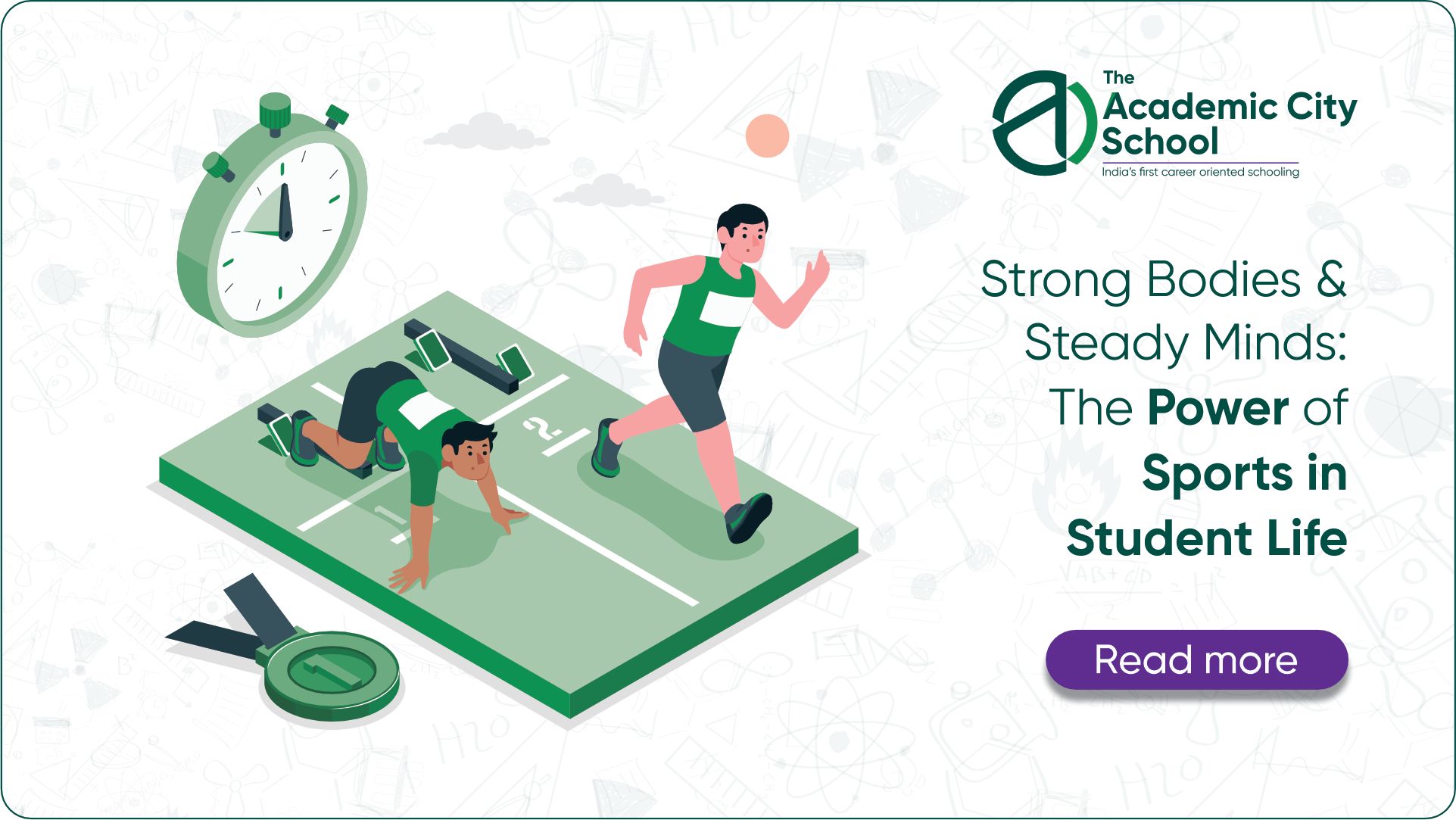
“A sound mind in a sound body” is an age-old truth that still holds power in today’s high-pressure academic world.
Parents often focus on marks and the future possibilities for the child. But ask any educationist and they’ll tell you physical activity is epitome for developing emotional stability. This is why hostel schools for boys and girls in India or co-ed boarding institutions increasingly put structured sports programs at the heart of their education model.
Why Sports Matter Beyond the Field
We know exercise improves health. But for children, it goes deeper:
- Stress release: Physical activity reduces cortisol levels, helping students manage exam pressure.
- Boosted mood: Sports stimulate endorphins, which naturally elevate happiness and focus.
- Better sleep: A structured mix of play and academics improves rest which is vital for learning and growing in general.
A 2019 report by the American College of Sports Medicine highlighted that children engaged in regular physical activity perform better academically and report higher emotional well-being.
Boarding Schools: Where Sports Are Daily Life
Unlike day schools, boarding schools in Bangalore and across India weave sports into daily routines. Here’s how:
- Structured timetables: Students have time carved out for games alongside academics.
- Variety of sports: From cricket and basketball to swimming and athletics, children explore different skills.
- Guided training: Professional coaches mentor students, helping them channel discipline and passion.
Sports are a part of the curriculum which makes the best boarding schools in Bangalore stand apart.
Emotional Lessons Sports Teach
Beyond fitness, every match or practice session is a classroom for life skills:
- Resilience: Learning to bounce back from a loss.
- Teamwork: Understanding how to depend on others and contribute.
- Leadership: Taking responsibility as captain or role model.
- Patience: Realising progress takes time and consistency.
As Nelson Mandela said: “Sport has the power to change the world. It has the power to inspire and unite people in a way that little else does.” For children, it has the power to build character.
Why Boarding Schools in Karnataka Lead the Way
Karnataka’s boarding schools, especially in Bangalore, have the advantage of:
- Spacious campuses that accommodate multiple sports.
- Green environments that naturally balance body and mind.
- Access to professional leagues and tournaments, giving students higher exposure.
Parents increasingly choose boarding schools in Karnataka because they see that children return home healthier, calmer, more focused and more confident.
The Academic City School: Sports as Soul Food
At The Academic City School (TAC), sports are given equal importance to that of academics. Here’s what sets TAC apart:
- Dedicated sports hours daily integrated into student timetables.
- Facilities for a wide range of sports from cricket to athletics and indoor games.
- Coaches and mentors who teach discipline alongside skills.
- Balance of academics and fitness to facilitate holistic growth of students.
Closing Thought: Balance is the Real Success
Sports are the foundation for emotional strength. On the playground children learn lessons no textbook can teach.
For parents exploring good boarding schools in India, it’s worth asking: Does the school see sports as soul food or just a side dish? At The Academic City School, sports fuel both the body and the mind, shaping students to be balanced.
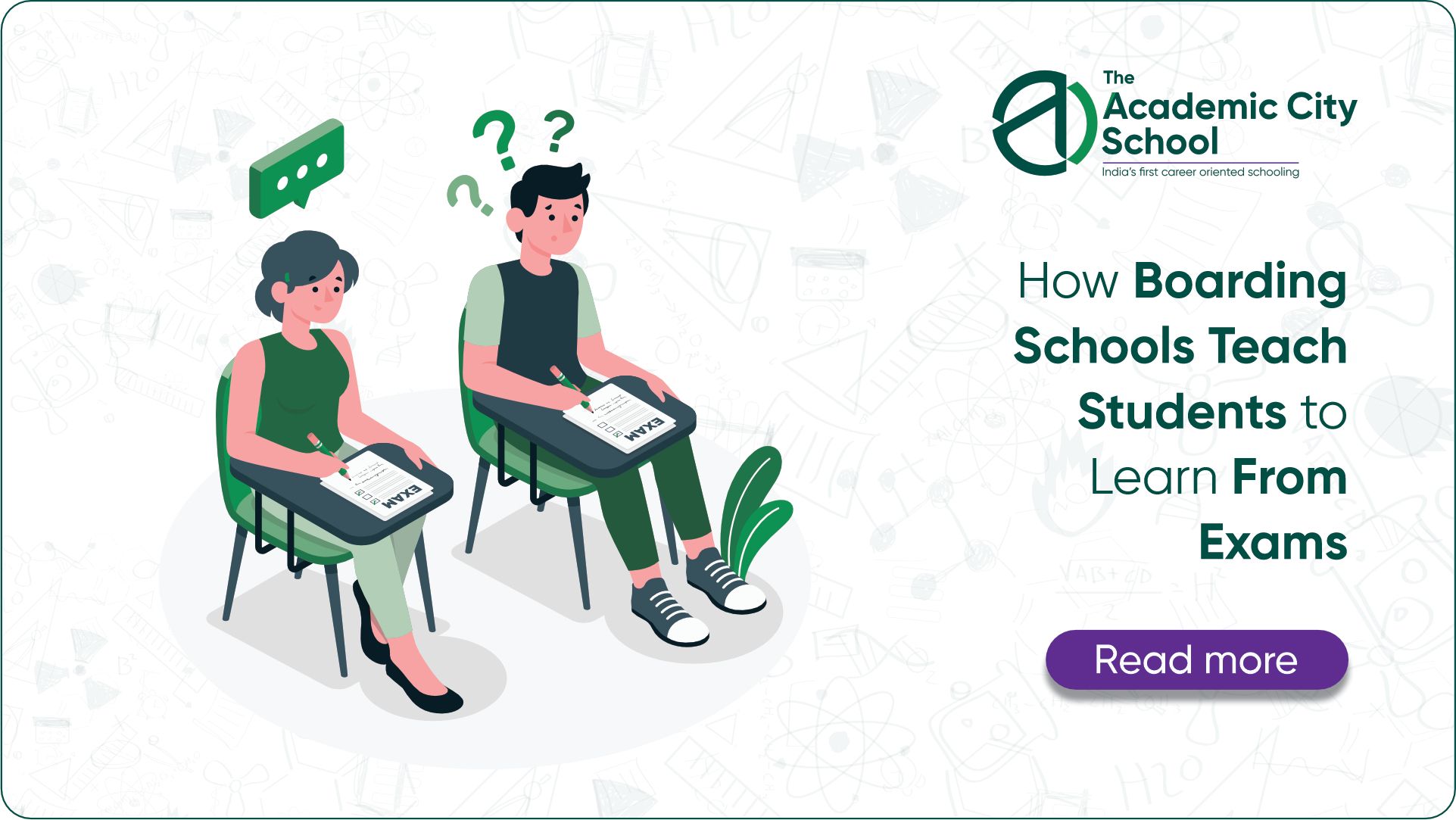
Introduction: Rethinking Exams
How many of us remember exams as moments of fear rather than growth? For decades, assessments have been viewed as finish lines — pass or fail, good or bad. But forward-looking educators are reframing the conversation: exams are checkpoints, not endpoints. They show students where they stand, what they’ve mastered and where they can grow next.
The real challenge? Helping children see exams this way. And this is where boarding schools in Karnataka and across India play a game-changing role, because of their structure in general.
Why Exams Are Misunderstood
- Pressure from grades: Marks often overshadow the learning journey.
- Rote vs. real understanding: Traditional exam prep rewards memorisation more than comprehension.
- Stress culture: Exams are often linked with anxiety, not reflection.
As educationist Carol Dweck, author of Mindset, explains:
“Tests should be seen as opportunities to measure growth, not as permanent judgments.”
Boarding Schools: Turning Exams Into Growth Tools
1. Continuous Feedback Over One-Off Judgments
In CBSE residential schools in Bangalore, students experience:
- Weekly reviews to track progress.
- Mock tests that help normalise the exam atmosphere.
- Feedback sessions where teachers highlight strengths and gaps.
2. Structured Preparation Reduces Fear
Boarding schools build routines around study and rest. With scheduled time for learning, exams become predictable. Students learn that consistent habits outweigh last-minute cramming.
Harvard research on adolescent learning shows structured study environments reduce stress and boost retention.
3. Teaching Reflection, Not Just Results
After exams, boarding schools encourage:
- Self-review: Students analyse mistakes and redo tricky problems.
- Teacher conferences: Guided discussions help them understand why they went wrong.
- Peer discussions: Group sharing normalises mistakes and highlights learning strategies.
The Growth Skills Exams Can Teach
Handled well, exams become tools for life:
- Resilience: Bouncing back after a tough paper.
- Adaptability: Learning new strategies for different types of questions.
- Time Management: Pacing answers within deadlines.
- Critical Thinking: Applying concepts instead of memorising them.
As the OECD’s Future of Education and Skills 2030 report notes:
“Assessment should build skills for lifelong learning, resilience, adaptability and curiosity.”
Beyond Marks: Connecting Exams to Higher Education
For parents, one big question is: How do exams prepare my child for college?
In boarding schools for higher education planning:
- Exams simulate real-world challenges like deadlines.
- Continuous assessments build confidence for competitive exams like JEE, NEET, SAT.
- Teachers mentor students on linking exam performance to career pathways.
Why Karnataka Leads in Exam Readiness
Boarding schools in Karnataka balance academics with wellbeing. Students benefit from:
- Green, calming campuses that reduce stress.
- Access to technology-enabled prep tools.
- Exposure to co-curriculars that keep mental health strong during exam seasons.
The Academic City School: Where Exams Become Stepping Stones
At The Academic City School (TAC), assessments are woven into learning. TAC focuses on:
- Personal Progression Plans: Tailored strategies for every child.
- Guided Exam Prep: Mock tests and reflective feedback.
- Balance of Pressure and Support: Stress management workshops and structured study routines.
- Higher Education Planning: Linking CBSE success to global opportunities.
Conclusion: Exams as Growth, Not Gloom
Exams don’t have to be dreaded. In the right environment, they’re mirrors that reflect strengths and weaknesses.
For parents considering boarding schools in India, especially CBSE residential schools in Bangalore and Karnataka, the question should be whether schools teach children to face exams with courage and clarity.

“The principal goal of education is to create men and women who are capable of doing new things, not simply repeating what other generations have done.” – Jean Piaget
In today’s world, this vision is impossible without technology. From chalkboards that once defined classrooms to interactive smartboards and AI-enabled learning platforms, education has come a long way. Parents now ask: Is technology truly improving learning or is it just a trend?
The answer lies in how CBSE boarding schools in Bangalore, future ready boarding schools in India and international residential schools in Bangalore are integrating technology as a driver of academic success.
Why Tech in Classrooms Matters
Technology has reshaped how children learn and retain information. A UNESCO report highlighted that digital tools improve both participation and comprehension, especially when used alongside traditional teaching.
In schools today:
- Visual learning: Smartboards allow teachers to bring concepts alive through diagrams and video simulations.
- Adaptive learning: Students can revise at their own pace with e-learning platforms.
- Global reach: Virtual exchanges connect students with peers and experts worldwide.
The Boarding School Advantage
While most schools adopt technology, boarding schools have the unique advantage of extending its use beyond classrooms.
- Round-the-clock access: With well-equipped labs and libraries, learning doesn’t stop at the bell.
- Structured digital habits: Students learn to balance screen time with real-world collaboration.
- Mentorship and monitoring: Teachers guide students on using technology responsibly and effectively.
Tools That Make a Difference
Technology in boarding schools is more about outcomes. Some impactful tools include:
- Flipped Classrooms: Students watch lessons online before class, using time with teachers for problem-solving.
- STEM Labs: Robotics and coding labs help translate theory into practice.
- AI-based Assessments: Platforms that track student progress and suggest personalised learning paths.
Skills for a Digital Future
Employers worldwide stress that tomorrow’s workforce needs digital literacy, critical thinking and adaptability along with subject matter expertise.
Global studies, including those by the OECD, show that students exposed to technology-supported learning are:
- More confident problem-solvers.
- Better at collaborating across platforms.
- More adaptable to future workplace technologies.
Why Bangalore Leads in Tech-Driven Schools
It’s no surprise that CBSE boarding schools in Bangalore stand out. Being in India’s tech hub means students are exposed to innovation firsthand:
- Visits to startups and global tech companies.
- Guest lectures from industry leaders.
- Internships and workshops that connect school to the real world.
The Academic City School: Where Tradition Meets Technology
At The Academic City School (TAC), technology is woven into the learning journey. Recognised among future ready boarding schools in India, TAC offers:
- Smart classrooms powered by interactive tools.
- A dedicated STEM and innovation lab.
- Digital platforms that track individual progress.
- Career guidance programs linked with global tech industries.
Conclusion: The Future is Digital—and Human
Technology is shaping education, but its power lies in how schools use it to enhance teaching. The smartest schools balance screens with human connection, ensuring children learn responsibility alongside digital skills.
The Academic City School stands as a shining example, where chalkboards and smartboards co-exist, shaping students into globally ready learners.
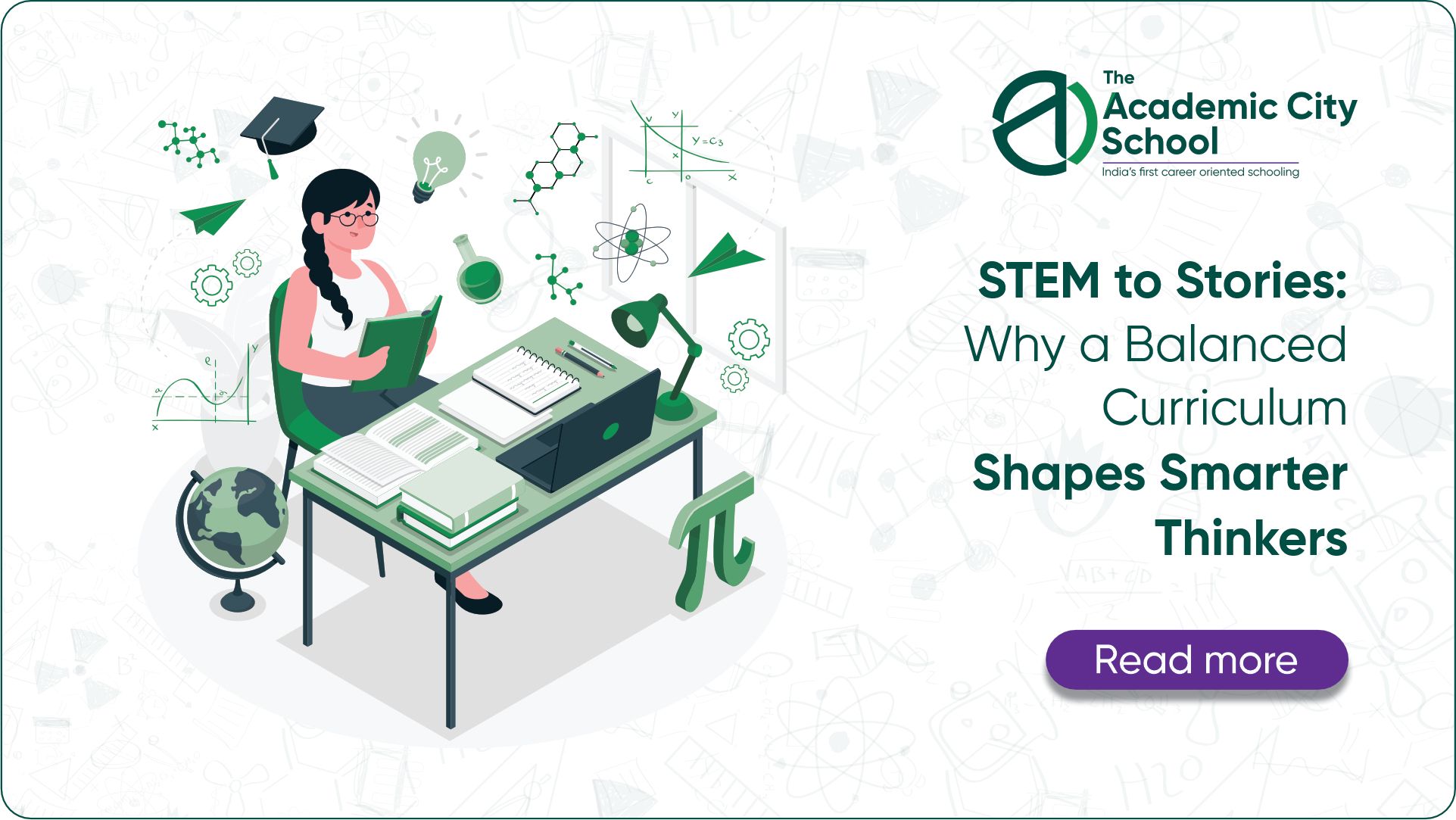
Introduction: More Than Just Marks
“What use is a mind if it can’t connect science with society or logic with imagination?” This question lies at the heart of education today. Parents everywhere want their children to excel in math and science, but also to think critically.
In CBSE residential schools in India, the shift is clear — academics no longer live in silos. The best boarding schools in India are blending STEM with humanities, sports and the arts to shape students into smarter, adaptable thinkers.
The Academic City School in Bangalore has pioneered this balance, making it one of the good boarding schools in Bangalore that truly embodies holistic growth.
Why Balance Matters: The Big Picture
For decades, education tilted heavily towards STEM — Science, Technology, Engineering and Mathematics. These subjects drive innovation and are crucial for careers. But as the World Economic Forum has repeatedly highlighted, the most valuable skills for the future also include creativity, communication and empathy.
Balanced curricula encourage children to not just solve equations, but to tell the story behind the numbers. To not just code, but to collaborate.
How Boarding Schools Create This Balance
A. Structured but Diverse Days
Unlike day schools, boarding schools in India have the time to integrate academics with co-curriculars. A student’s day might flow from physics class to basketball practice, then from evening study hall to a debate session.
As Sir Ken Robinson noted, “Creativity is as important as literacy.” Boarding schools embrace this principle by giving children exposure to both.
B. STEM Gets Humanised
CBSE residential schools in India encourage students to explore the human side of STEM:
- Designing science models that solve community problems.
- Writing reflective essays on environmental issues.
- Combining coding with storytelling in digital media clubs.
C. Arts and Sports Build Skills for STEM
It may surprise parents, but music improves math comprehension and sports teach focus and resilience — qualities essential for scientists and engineers. A balanced curriculum connects these dots.
A 2019 UNESCO report emphasised that integrating arts and culture into education fosters innovation. Good boarding schools in Bangalore are taking this seriously by giving equal weight to stage performances, art labs and design clubs.
The Real Outcomes of Balance
- Smarter Decision-Making: Students learn to see problems from multiple angles.
- Better Communication: Future engineers can explain complex ideas clearly.
- Adaptability: Switching between subjects trains the brain to adapt quickly.
- Confidence: Performing on stage or winning a debate builds the same confidence needed to present research or pitch ideas.
As Nobel Laureate Rabindranath Tagore once said, “The highest education is that which does not merely give us information but makes our life in harmony with all existence.” Boarding schools live out this philosophy daily.
The Academic City School (TAC)
At The Academic City School in Bangalore, balance is part of the DNA. Here’s what sets TAC apart:
- CBSE Excellence: Rigorous academics with individual progression plans.
- STEM Meets Arts: Robotics clubs run alongside theatre groups and music bands.
- Sports for Focus: Dedicated fields and coaches keep fitness at par with academics.
- Leadership & Expression: Debates, Model UNs and cultural events sharpen confidence.
Conclusion: Raising Smarter Thinkers
In today’s world, knowledge without creativity falls short and creativity without discipline loses direction. Balanced education is an absolute necessity.
Boarding schools in India, especially good boarding schools in Bangalore like The Academic City School, provide this balance every day. By blending STEM with stories, logic with imagination and academics with life skills, they’re preparing children for futures where they thrive.
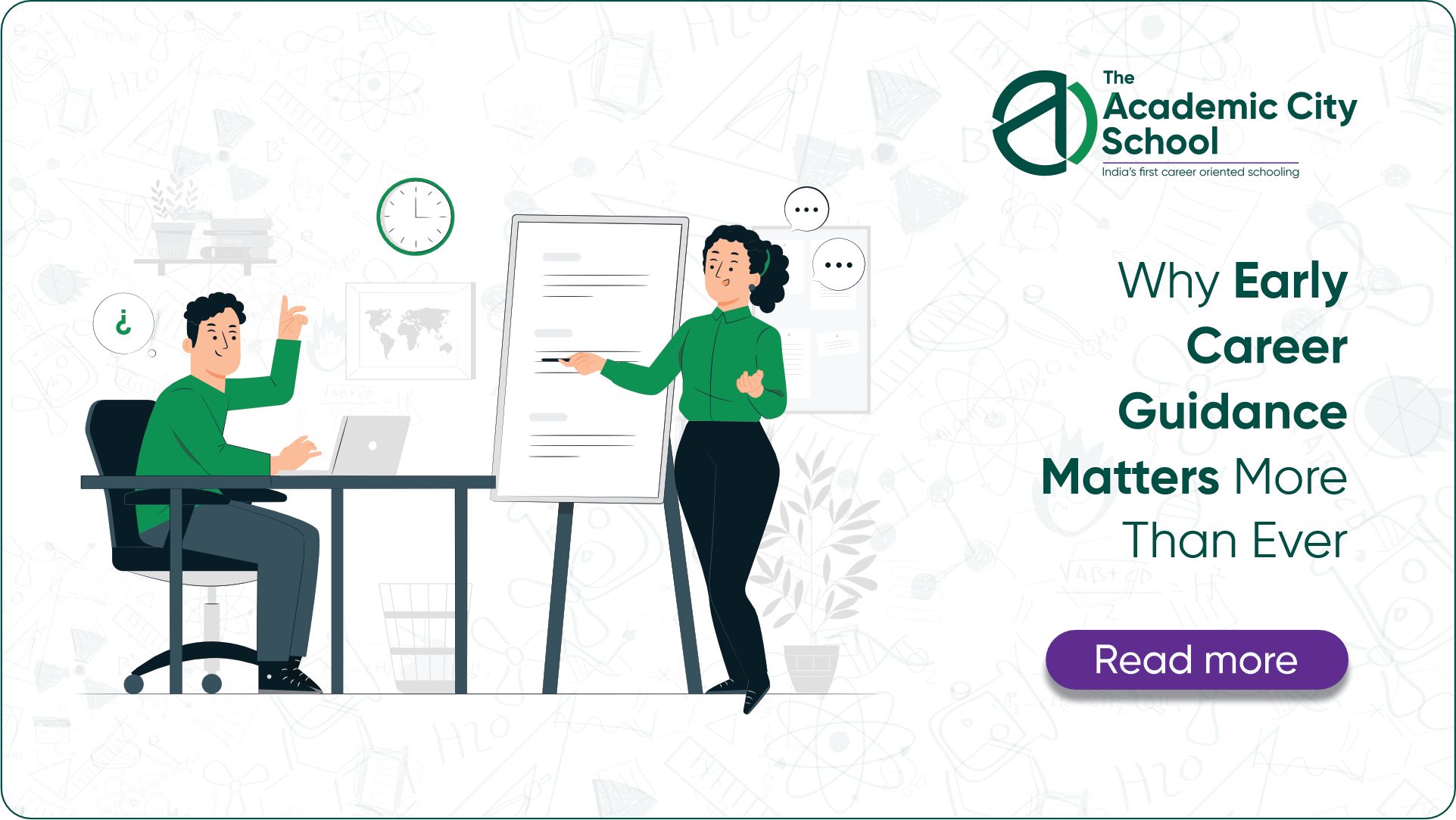
“Children must be taught how to think, not what to think.” – Margaret Mead
Parents often wonder: Will my child’s education really prepare them for life? In today’s fast-changing world, this is no small question. Careers no longer follow predictable paths. The fast changing world is reshaping opportunities every day. That’s why early career guidance has become essential. It is not something to postpone until college.
And this is where boarding schools for career counseling in India are making a real difference.
Why Career Guidance Cannot Wait Until College
A generation ago, career decisions often started after Class 12. But today, waiting that long can leave students confused or unprepared.
According to the OECD’s “Dream Jobs?” study, teenagers who engage in workplace-linked activities such as internships are significantly more likely to land jobs aligned with their interests in adulthood. Early exposure builds clarity and resilience, while delayed guidance often leads to rushed, less-informed choices.
What Career Guidance Looks Like in Schools
In international boarding schools for career guidance, future-readiness is a practice.
- Aptitude & Strength Mapping: Regular assessments highlight student strengths and help align them with career paths.
- Personalised Roadmaps: Mentors craft progression plans that evolve with each child’s interests.
- Parent Involvement: Families join counseling sessions so decisions are collaborative.
- Industry Interaction: Guest lectures, project-based learning and career fairs bridge academics with real-world opportunities.
Why Boarding Schools Are Uniquely Suited
Day schools often struggle to dedicate consistent time to career planning. Boarding schools, with their structured environment, can integrate guidance seamlessly:
- Dedicated career cells that track student progress over years.
- After-hours sessions without the pressure of commutes.
- Peer mentoring, where seniors share insights with juniors.
- Clubs and co-curriculars designed around career exposure.
Career exploration isn’t a destination. It’s a journey. Boarding schools, with their time and structured environment, make that journey meaningful and fruitful.
Why Bangalore Offers a Unique Edge
When parents think of career focused hostel schools in Bangalore, the location itself is a major advantage.
- Students gain access to tech hubs and start-up ecosystems.
- Workshops, innovation labs, and corporate visits show careers in action.
- Networking opportunities with entrepreneurs and professionals broaden horizons.
- A balance of global exposure with Indian cultural grounding makes for a holistic learning environment.
Skills That Last a Lifetime
Career counseling shapes transferable skills that stay with children for life:
- Adaptability: Handling new environments with ease.
- Critical Thinking: Evaluating choices and perspectives before deciding.
- Communication: Expressing ideas confidently in diverse settings.
- Confidence: Believing in their ability to chase unconventional opportunities.
A World Economic Forum report confirms that employers rank these life skills as highly as academic qualifications. Boarding schools provide the stage where these skills are developed daily.
The Academic City School: Turning Guidance Into Growth
At The Academic City School (TAC), career counseling is not left to chance. Recognised among top international boarding schools for career guidance, TAC ensures that students are equipped for life beyond exams.
Here’s how TAC makes a difference:
- Structured Counseling Tracks: Begin as early as middle school.
- University & Industry Partnerships: Students interact with mentors across the globe.
- Balanced Ecosystem: Strong CBSE academics + leadership, arts, STEM and sports.
- Future-Ready Planning: Guidance for both Indian and international universities.
Parents often describe TAC as a place where discipline meets creativity and where their children return home inspired.
Conclusion: Guidance Today, Opportunities Tomorrow
Postponing career conversations risks leaving students anxious or underprepared. Starting early, on the other hand, builds resilience, clarity and courage to dream bigger.
As Nelson Mandela said, “Education is the most powerful weapon which you can use to change the world.” Today, part of that education is career guidance that equips children for industries and roles we cannot yet imagine.

“Education is the most powerful weapon which you can use to change the world.” – Nelson Mandela
In today’s interconnected world, those words carry more weight than ever. Education isn’t only about marks or mastering a subject—it’s about preparing children for a global stage where opportunities cross borders and careers demand adaptability. Parents increasingly ask: “How do I make sure my child is future-ready?”
The answer lies in schools that embed global exposure into everyday learning. That’s why international boarding schools for career guidance and future-ready boarding schools in India are becoming the first choice for families who want more than conventional academics.
Why Global Exposure Matters Today
Global careers no longer follow straight lines. A student may study medicine in India, specialise in public health in Europe, and later work for an NGO in Africa. Opportunities shift rapidly, and children exposed to diverse perspectives early are better prepared to thrive.
The OECD’s Future of Education and Skills 2030 framework notes that “global competence” is as vital as literacy or numeracy. It means being able to connect and collaborate across cultures—skills best developed in diverse school environments. Global exposure equips children with the tools to adapt and innovate in uncertain futures.
What Global Exposure Looks Like in Schools
It goes far beyond exchange trips or language electives. In future-ready boarding schools in India, global exposure is built into daily life:
- Classrooms of Diversity: Students interact with peers from across states and countries, making global history and culture part of everyday learning.
- Mentorship from Across Borders: Guest lectures and collaborations connect learners with experts worldwide, giving them insights into modern careers.
- Exchange & Collaboration: International partnerships enable joint projects, cultural exchanges, and even virtual internships, preparing students to work in global teams.
Skills That Come With Global Exposure
Parents often ask if global exposure translates into skills. The answer is yes. It builds qualities employers rank alongside academics:
- Adaptability: Learning to adjust to new environments and ideas.
- Critical Thinking: Exposure to diverse viewpoints sharpens analysis and decision-making.
- Communication: Students learn to express ideas clearly across cultures and contexts.
- Confidence: Presenting at international workshops or competing globally develops self-belief.
The UNESCO Global Education Monitoring Report highlights that schools offering international programs help students nurture empathy and collaboration—skills vital in today’s workplaces.
The Career Connection
Global exposure is closely tied to career readiness. In boarding schools focused on higher education planning, career conversations begin early—not in Grade 12. Students benefit from:
- Aptitude Tests & Assessments: Aligning strengths with opportunities.
- Parental Involvement: Guidance sessions keep parents part of the decision-making process.
- Higher Education Insights: Preparing for both Indian and international systems with exam prep, portfolios, and interviews.
Why Bangalore Leads the Way
When it comes to boarding schools in India, location matters. Bangalore—often called the Silicon Valley of India—offers unmatched opportunities. Career-focused hostel schools here connect students directly to tech hubs, research institutions, and multinational corporations.
Industry visits, innovation workshops, and talks by entrepreneurs show careers in action. This unique mix of global industry access and cultural grounding makes Bangalore and Karnataka top destinations for international-standard boarding schools.
A Parent’s Lens
Parents who once hesitated about boarding schools now speak of transformations. Children return home more articulate, ambitious, and clear about their goals. As Sir Ken Robinson said, “Education is not about filling a bucket, but lighting a fire.” Global exposure lights that fire early—opening possibilities many students may never have considered.
The Academic City School: Global Readiness in Action
At The Academic City School (TAC), global exposure is not an event but a culture. Recognised as one of India’s future-ready boarding schools, TAC integrates international opportunities into a strong CBSE foundation:
- Career Counseling Tracks: Step-by-step plans for academic and career readiness.
- International Mentorship: Access to global experts, projects, and collaborations.
- Holistic Growth: STEM, arts, sports, and leadership built into school life.
- Higher Education Planning: Guidance for both Indian and international university pathways.
Conclusion: Education Without Borders
Global exposure bridges learning with opportunity. It shapes academic strength and resilience, but also adaptability and vision. International boarding schools for career guidance and higher education planning prepare children for a world where success depends on confidence as much as competence.
At The Academic City School, this vision comes alive daily. Students graduate with a mindset ready for tomorrow’s challenges and opportunities—education without borders.

What works for one child may not work for another. Every parent knows this instinctively. Yet, in traditional classrooms, students are often expected to learn in the same way, at the same pace, with the same methods. That’s where personalised learning steps in—and why good boarding schools in India are taking it seriously.
At CBSE residential schools in India, the focus is shifting from “one-size-fits-all” academics to approaches where every child’s unique strengths and pace are taken into account.
Why Personalised Learning Matters
Children thrive when teaching adapts to them, instead of forcing them to adapt to rigid teaching styles. Research and practice in personalised learning show improvements not only in test performance but also in problem-solving and critical-thinking—exactly the kind of growth many parents want for their children.
How Boarding Schools in India Put Personalisation into Practice
Unlike day schools—where time with students is limited—boarding schools offer the advantage of continuous learning environments. Teachers don’t just see children in class; they observe study habits, extracurricular strengths, behaviour, and how students respond to setbacks. Personalisation shows up in many practical ways:
- Individual Progression Plans: Customised learning roadmaps help every learner move forward. A student struggling in science might get extra lab time, while another excelling in literature could be guided into debates and writing clubs.
- Mentorship Beyond Classrooms: Thoughtful conversations during dorm study hours or at lunch often reveal what truly excites a student, helping educators guide academic choices and goal-setting.
- Flexible Learning Methods: Visual, hands-on, discussion-oriented—CBSE residential schools increasingly weave in project-based learning, flipped classrooms, self-directed modules, gamified tasks, and tech-enabled experiences to match learning styles.
Real-Life Impact: Stories of Change
In personalised environments, children often discover strengths they didn’t know they had. Active participation in clubs, labs, arts, and sports builds communication and confidence over time. When challenges are identified early and addressed through mentorship, students not only overcome weaknesses but also develop resilience—and the ability to thrive in new areas.
Boarding Schools and the Academic Edge
Personalised learning isn’t only about academics—but it does make academics smarter and healthier:
- Structured Exam Prep: Instead of last-minute cramming, students follow customised study schedules with timely feedback and revision loops.
- Career Guidance: Many boarding schools combine aptitude profiling with personalised mentoring so students discover interests early and plan pathways with clarity.
- Resilience & Balance: Because learners progress at their own pace, they’re less likely to burn out under pressure—and more likely to sustain curiosity.
Why Location Matters
Schools in Bengaluru, for example, benefit from proximity to tech hubs, universities, multinational companies, and start-ups. Career-focused hostel schools can connect students with real-world exposure—guest lectures, internships, innovation workshops, and visits to research labs—so classroom concepts meet practical applications.
The Academic City School: Personalisation in Action
At The Academic City School (TAC), personalised learning is a day-to-day practice designed to help each learner find and follow their path:
- Individual Progression Plans (IPPs): Every student has a clear roadmap with goals, supports, and periodic reviews.
- Mentorship Model: Teachers and mentors guide both academic progress and emotional wellbeing.
- Balanced Approach: Equal focus on curricular, co-curricular, and life skills—so strengths are nurtured alongside fundamentals.
- Global Readiness: Opportunities to connect with international mentors and collaborative projects expand horizons and confidence.
Parents often describe TAC as a place where children “find themselves.”
Closing Thought: Every Child, Their Own Path
Education should help children understand their strengths—and use them well. Personalised learning at good boarding schools in India is making this possible every day. At The Academic City School, children follow a path designed for them. Because the future isn’t one-size-fits-all. And neither should education be.
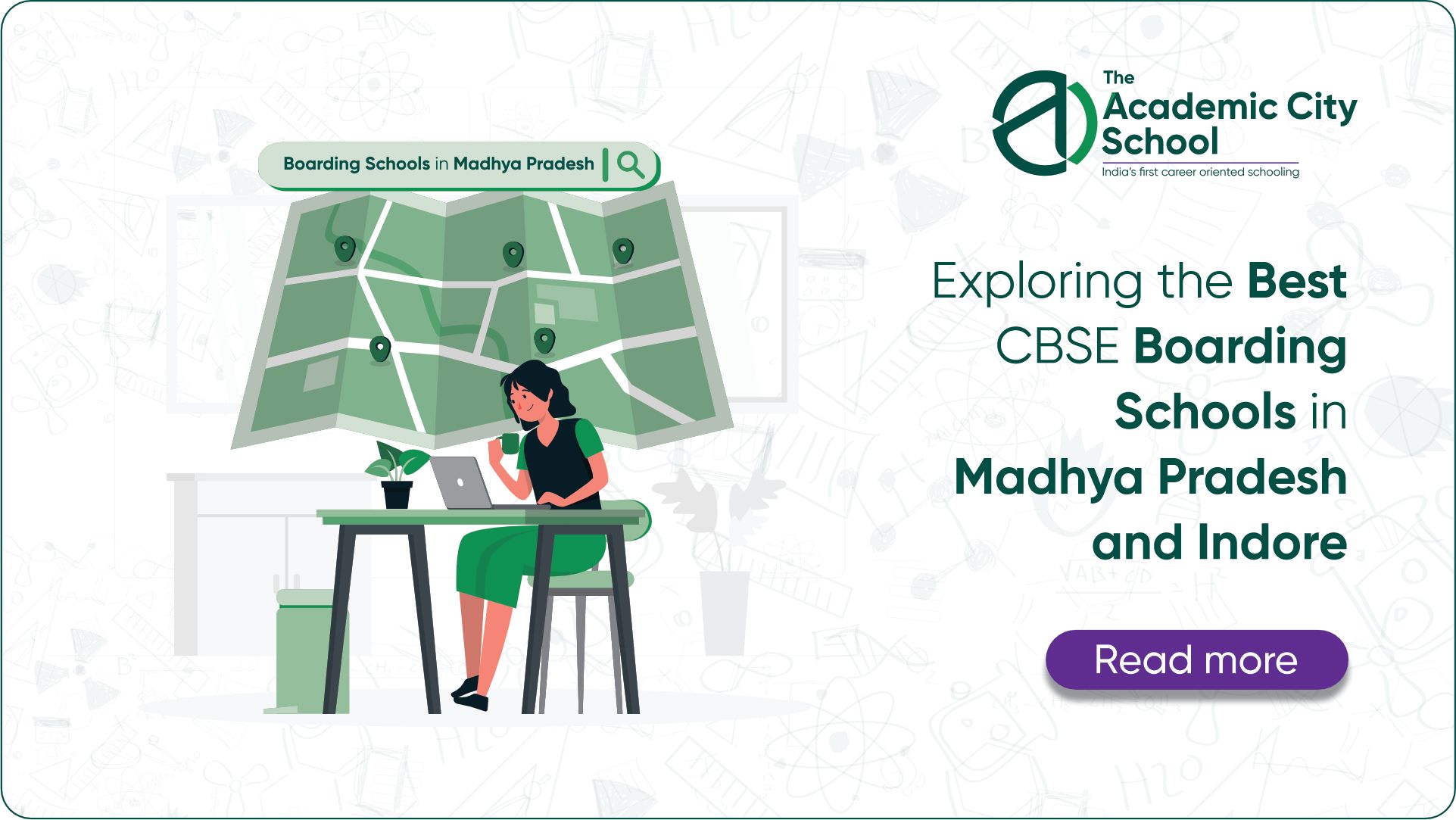
A Parent’s Guide to Choosing the Right Path for Your Child
“What if your child’s classroom stretched beyond walls, books and bells?” That’s the promise of residential schools. In Madhya Pradesh and Indore, the demand for CBSE boarding schools has been steadily rising—and for good reason. Parents today want more than grades; they want life skills and a supportive environment where children grow into well-rounded, confident individuals.
Why Parents Are Turning to CBSE Boarding Schools in Madhya Pradesh
CBSE has long been a strong backbone for Indian education, with clear pathways for national exams and widely recognised standards. Paired with the residential model, its impact multiplies:
- Academic continuity: Students benefit from structured study hours and teacher guidance beyond the classroom.
- Consistency: A residential routine blends study, sports, activities, and reflection into the day-to-day rhythm.
- Focus: Without long commutes or frequent distractions, children can devote quality time to academics and skill-building.
A 2022 review related to the National Education Policy observed that structured residential settings naturally encourage peer learning and time management—two abilities families in Madhya Pradesh value deeply.
Beyond Academics: Building the Whole Child
One of the biggest strengths of residential schools in Indore and across Madhya Pradesh is the emphasis on personality development and real-world skills:
- Leadership & teamwork: From school councils to house events and sports captains, children get early, repeated chances to lead and collaborate.
- Resilience & independence: Living away from home helps students manage routines, care for belongings, and adapt confidently.
- Creativity & curiosity: Arts, robotics, debating, and theatre nurture passions alongside academics.
Residential Life: Friendships and Cultural Exposure
Indore’s schools reflect the city’s cultural richness and diversity. Students live and learn with peers from across India, which helps them develop a broader worldview:
- Lifelong friendships: Shared routines and experiences forge strong bonds.
- Cultural fluency: Children learn to appreciate diverse traditions and perspectives.
- Social intelligence: Daily community living builds communication skills and empathy.
What to Look for in a CBSE Boarding School
If you’re evaluating CBSE residential schools in India—especially in Madhya Pradesh and Indore—use this practical checklist:
- Campus & infrastructure: Safe, green campuses; modern labs, libraries, playgrounds; well-equipped hostels.
- Academic excellence: Experienced faculty, strong board results, and supportive academic processes.
- Pastoral care: Mentors and counselors who support both emotional wellbeing and academics.
- Extracurricular depth: Balanced programs in arts, sports, clubs, and leadership.
- Career readiness: Guidance for competitive exams and future-ready skills (communication, problem-solving, digital literacy).
Spotlight on Indore: Why Families Choose It
Indore has emerged as a central India education hub. Families appreciate its balance of opportunity and safety:
- Access to enrichment: Cultural, industrial, and academic resources within reach.
- Holistic ecosystem: A growing set of residential schools committed to whole-child development.
- Right-sized city: A location that blends tradition with progress and supportive community values.
The Academic City School (TAC): A Model for Holistic Education
Among CBSE boarding options in Madhya Pradesh, The Academic City School (TAC) stands out for its student-centred approach:
- Academic strength: Rigorous CBSE curriculum supported by Individual Progression Plans and continuous feedback.
- Holistic growth: Sports, arts, STEM clubs, and leadership programs are built into the week—not just add-ons.
- Pastoral care: A warm, safe environment where every child is known, guided, and encouraged.
- Global readiness: Opportunities to engage with mentors, projects, and collaborations that broaden horizons.
Parents often describe TAC as a “second home” where discipline meets creativity—helping children grow with confidence and purpose.
Closing Thought: Education That Lasts a Lifetime
Choosing the right CBSE residential school in Indore or Madhya Pradesh shapes more than report cards—it shapes character. Academic excellence matters, but so do resilience, leadership, empathy, and a love for learning. The Academic City School exemplifies this philosophy, preparing children not just for exams, but for life.
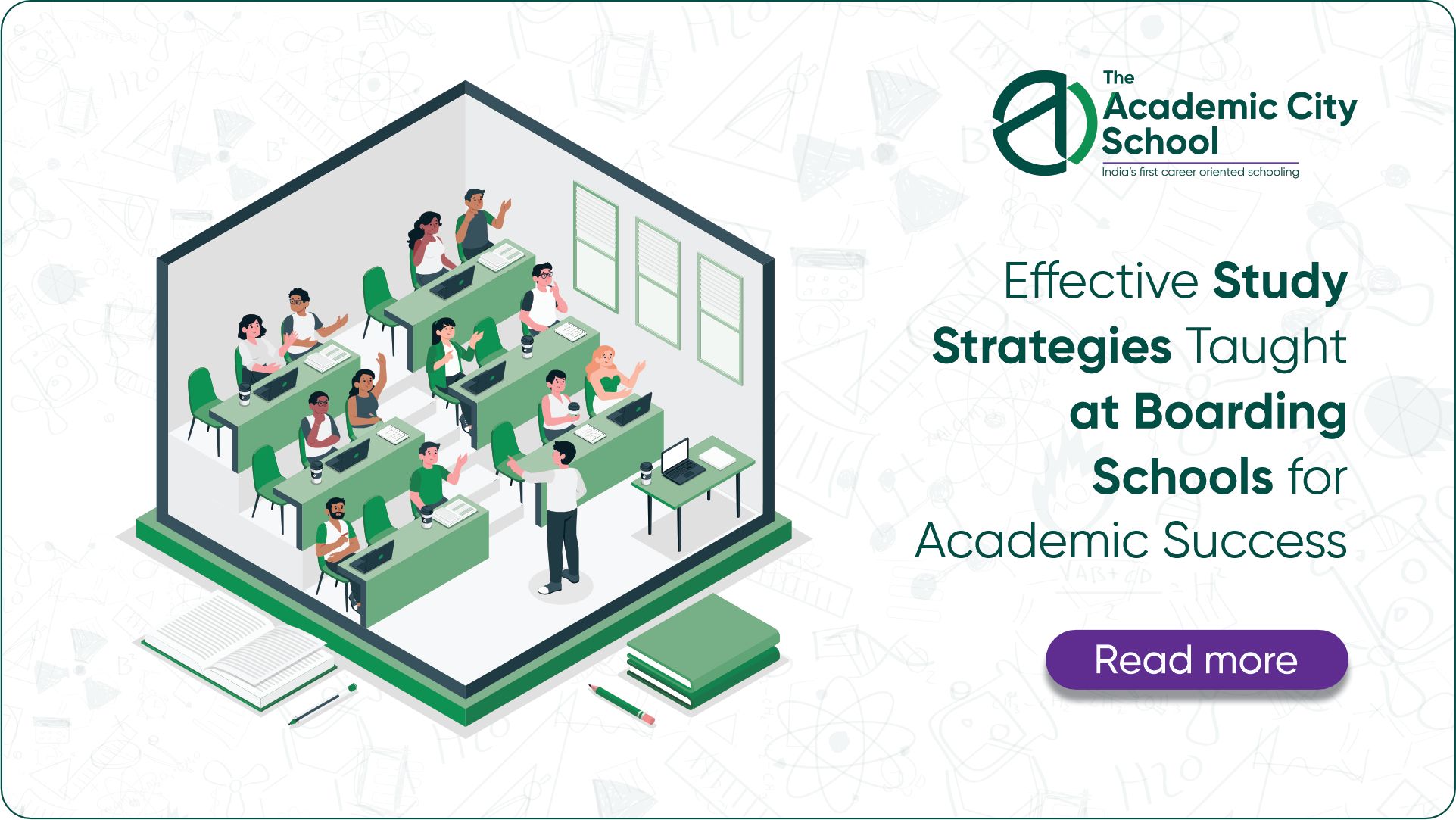
Unlocking Smarter Learning. How Boarding Schools Equip Students to Excel!
Learning Beyond the Desk
What if every hour your child studied, counted double? That’s the promise of strategy-led learning. Success today is a lot about learning how to learn. Sounds confusing? Let’s decode it…
Boarding schools in India are uniquely placed to teach students how to learn, because all of us understand and agree that rote method (what we saw growing up) may help children memorise facts, but it doesn’t build understanding and that leaves them struggling to apply knowledge in real-life situations.
With structured routines and mentorship, the environment is built for focus which turns studying into a skill that lasts for life.
Why Boarding Schools Have the Edge!
Turning Time into an Ally
In good boarding schools in Bangalore, a child’s day is designed with balance—study hours, meals, sports, and downtime. This rhythm helps students stay on track without the chaos of procrastination.
Harvard’s Center on the Developing Child notes that consistent routines build planning and focus skills, both of which are vital for academic success.
Personal Attention That Matters
In CBSE residential schools, small class sizes mean no child is overlooked. Teachers become mentors. They notice when a child struggles, they encourage the children’s strengths and they help build confidence step by step.
The Power of Peers
Studying in groups is common in boarding schools. They learn best when they discuss in groups and help each other understand concepts. Such learning stays for life. A Stanford study even showed that peer-to-peer teaching improves retention significantly. Parents often say their children return home explaining concepts more clearly than ever—a solid proof of learning that sticks.
Study Strategies That Work
Active Learning, Not Rote
Children are encouraged to create mind maps and practise with quizzes to test their knowledge in real-world contexts. It’s about connecting ideas.
Progress in Small Steps
Success doesn’t come in leaps. Boarding schools teach children to set smaller milestones and celebrate each one. Weekly progress reviews give clarity and reduce last-minute exam panic.
Exam Preparation with Calm
Mock exams and timed practice papers before tests help children walk into exams with confidence.
Looking Ahead: From School to College
Roadmaps for Higher Education
Boarding schools for higher education planning start early. Counselors help children choose subjects wisely and prepare for entrance exams.
Building Transferable Skills
Academic strength is paired with life skills such as research, presentation, communication and problem-solving. These are the qualities that prepare students for careers.
Why Setting Matters
Location and environment shape how children study. Boarding schools in Karnataka often combine calm, green surroundings with modern facilities. In Bangalore, career-focused hostel schools also connect students with tech hubs and industry visits. The result? A child who learns with focus and looks ahead with ambition.
The Academic City School: Where Study Habits Become Life Habits
At The Academic City School, study strategies are practised as a part of everyday life.
- Individual progression plans tailored to each child
- Structured study routines that encourage discipline without stress
- Mentorship that balances academics with emotional care
- Guidance for CBSE success alongside higher education planning
TAC ensures children learn how to work smarter. Parents often remark how their children become confident individuals.
Smarter Learning, Brighter Futures
The difference between average results and lasting success often lies in strategy. Boarding schools in India are helping children master the art of studying.
At The Academic City School, these strategies come alive daily, helping students prepare for life’s bigger tests.
Quick Exam Prep Toolkit For Students
10 Smart Exam Preparation Strategies
- Plan Backwards from Exam Dates – Break subjects into smaller chunks and map them week by week instead of cramming at the last minute.
- Set Daily Study Goals – Focus on mastering one concept or chapter at a time. Specific goals make progress measurable.
- Use Active Recall Over Rote – Test yourself with flashcards, practice questions or by teaching a peer. This boosts retention more than passive reading.
- Spaced Repetition for Memory – Revisit key topics at regular intervals (e.g., after 1 day, 3 days, 1 week) to cement them in long-term memory.
- Practice Past Papers – Solve previous years’ papers or mock tests under timed conditions to build exam stamina and familiarity with formats.
- Create Visual Maps – Diagrams and flowcharts help simplify complex topics and strengthen connections.
- Mix Subjects in a Day – Studying two or three different subjects daily keeps the brain alert and prevents fatigue.
- Stay Physically Active – Short walks, stretching, quick exercises or even meditation improve focus and reduce stress during long study hours.
- Sleep & Nutrition as Study Tools – Adequate rest and balanced meals enhance concentration and memory consolidation.
- Reflect at the End of Each Day – Spend 10 minutes reviewing what worked, what didn’t and what to adjust in the next day’s plan.
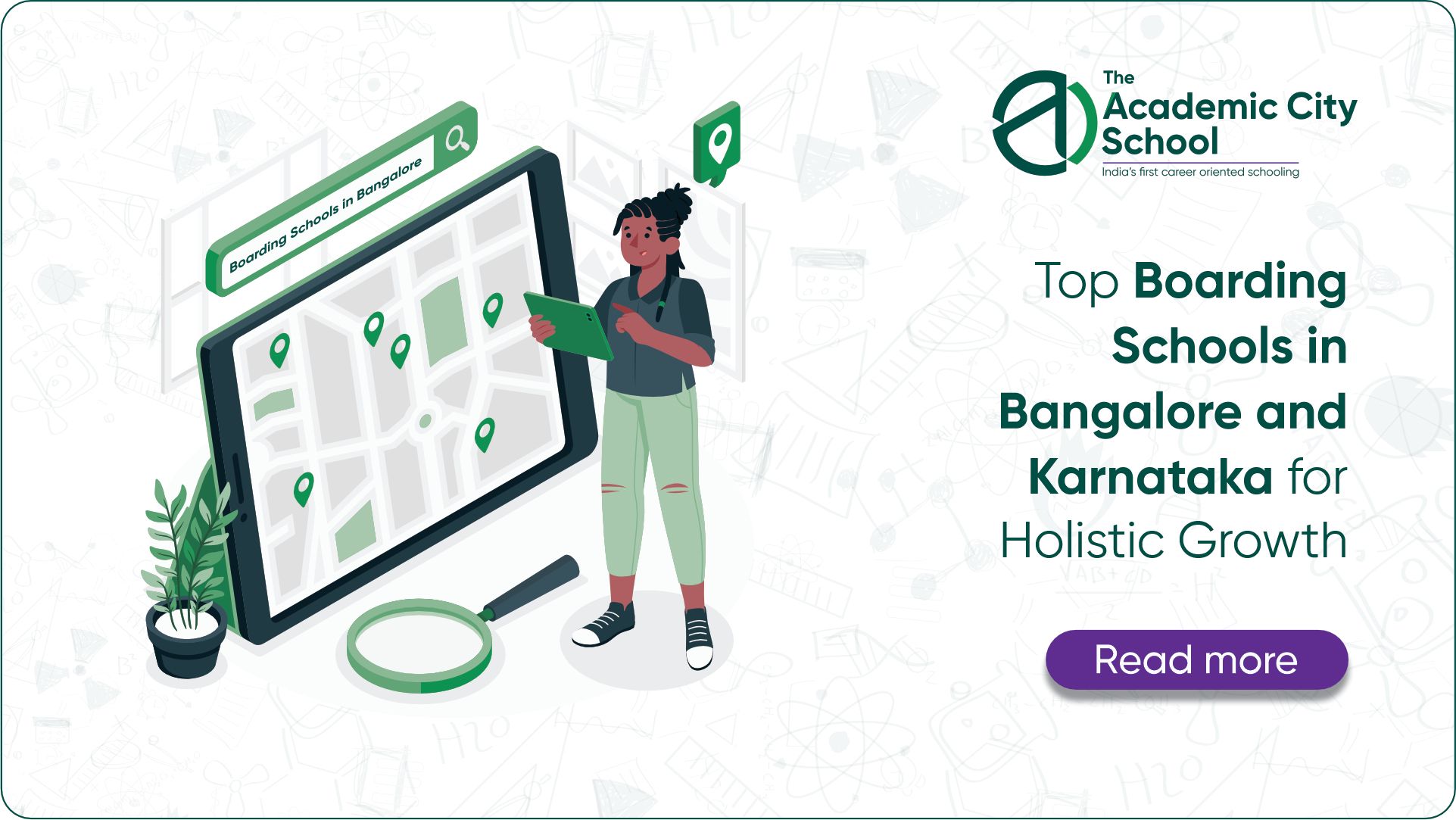
Where Education Meets Character and Confidence
Every parent asks the same quiet question: Am I preparing my child for exams or for life?
In today’s world, the answer cannot stop with grades alone. Children need confidence and adaptability to thrive. That’s why many families are turning to boarding schools in Bangalore and Karnataka—places where classrooms stretch into life.
At The Academic City School, we meet parents every week who say, “We don’t just want results, we want resilience.” This is where holistic growth truly begins.
Why Bangalore and Karnataka?
Few regions in India bring together tradition and innovation quite like Karnataka. Bangalore, with its tech hubs and cosmopolitan culture, gives students early exposure to global thinking. The wider state adds heritage and a legacy of quality education.
For parents, that means the best of both worlds—children who grow up rooted in values, yet ready to face tomorrow’s challenges.
Life Inside a Boarding School
Boarding life feels different. Children do everything together, absorbing lessons from books and from each other.
- Routines build discipline.
- Chores build independence.
- Friendships build emotional strength.
One former student of a leading Karnataka boarding school said, “I came back for holidays and my parents were shocked that I was waking up on time without being told.” Small changes like these add up to lifelong habits.
What Holistic Growth Looks Like
Strong academics are only the start. The best schools weave in curriculars and co-curriculars with emotional care as part of daily life. On the cricket field, children learn teamwork. In the music room, they discover expression. In counseling sessions, they find space to process feelings. And in dormitories, they learn to respect differences and live with empathy.
Educationist Sir Ken Robinson once said, “Education is not just about learning facts, but about unlocking creativity.” Boarding schools that embrace this idea help children grow into complete individuals.
What Makes the Best Schools Stand Out
When parents search for the best boarding schools in Bangalore or Karnataka, they often look beyond facilities. They look for safety and balance.
Modern labs and libraries matter. At the same time, mentors who know every child by name matter too. International exposure matters. At the same time, the culture of discipline and independence matters too. It’s this balance that makes boarding education holistic.
The Academic City School Difference
At TAC, we believe education must prepare children for both careers and character. That’s why:
- Our CBSE foundation is matched with personalised learning plans.
- Every student engages in sports, arts, leadership and STEM programs.
- Pastoral care ensures emotional wellbeing is never left behind.
- International exposure comes built into the curriculum.
A TAC parent recently said, “When my daughter joined, she was shy. Today she speaks on stage with confidence. That is more valuable to me than any mark sheet.”
The Takeaway
Holistic growth is the future. The boarding schools in Karnataka that succeed are the ones preparing children to face life with courage and competence.
At The Academic City School, we carry this promise forward. Our students prepare for life.
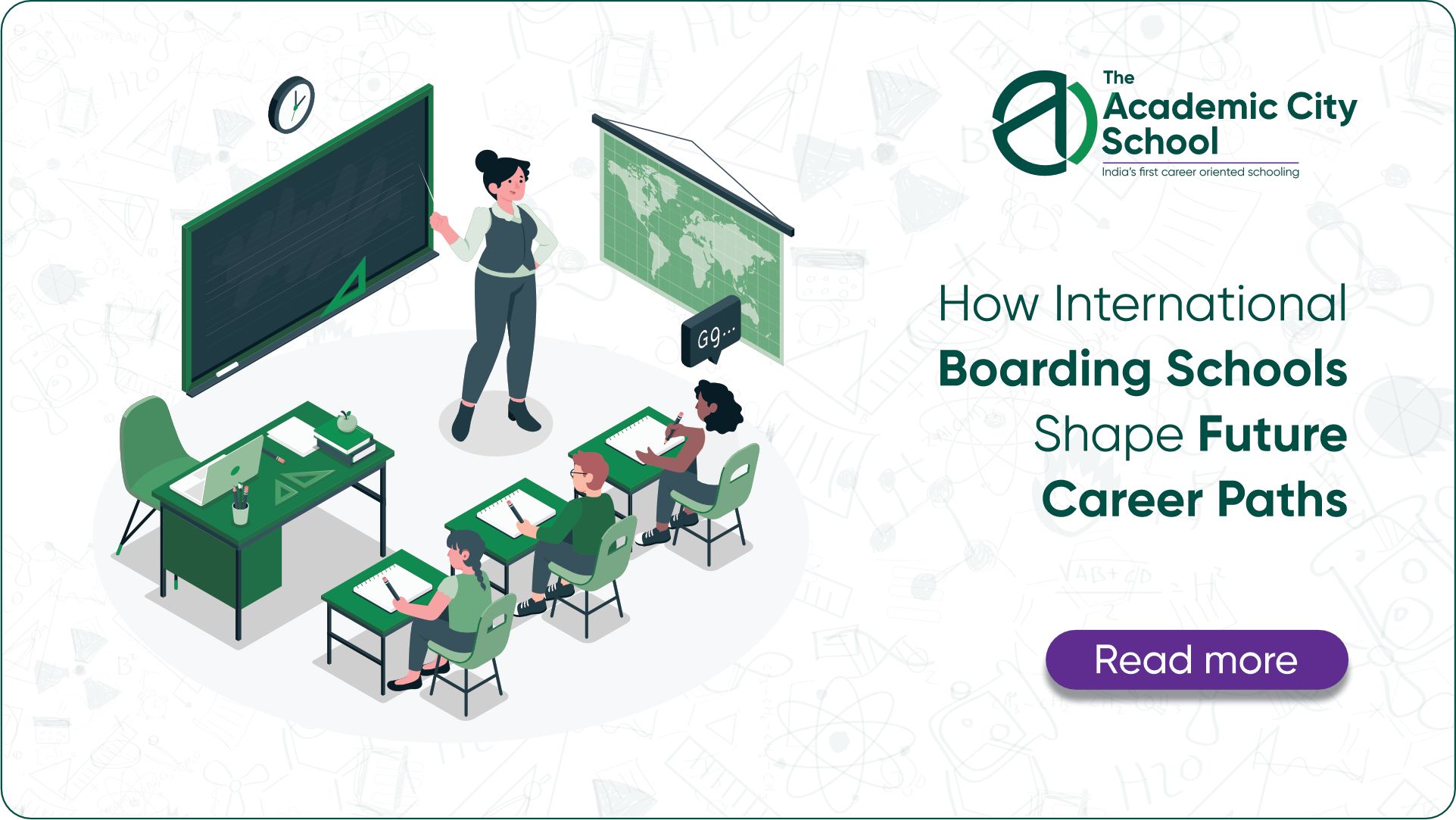
From classrooms to careers, how the right environment builds tomorrow’s leaders!
The Big Question Parents Ask
Every parent wonders: “Will my child’s education truly prepare them for life ahead?”
In today’s world, careers don’t follow a straight line anymore. A child may dream of medicine today, switch to design tomorrow, and later discover opportunities in global industries we can’t even imagine right now. That’s why international boarding schools for career guidance are stepping in to shape futures with real-world skills.
At The Academic City School, this is a daily reality. Here, classrooms are about preparing children for the careers and challenges of the future.
Why Career Guidance Matters Early
Research by the OECD shows that teenagers who engage in workplace-linked activities like internships or career talks are more likely to thrive in adulthood. Early exposure to career pathways reduces confusion and boosts confidence later on.
When students explore careers in their school years, they:
- Connect interests with opportunities.
- Build resilience against future uncertainty.
- Make informed subject and college choices.
What International Boarding Schools Do Differently
Unlike traditional setups, international boarding schools for career guidance build career readiness into everyday learning.
Personalised roadmaps: Students undergo strength assessments, interest mapping, and one-on-one counseling. Parents are often part of these conversations, ensuring that guidance feels personal and aligned.
Global mentorship: Through guest lectures and collaborative exchange programs, students connect with global experts and industries that help broaden their horizon far beyond local boundaries.
Inside Boarding Schools in India: Career Conversations That Count
Closer to home, many boarding schools for career counseling in India are building structured guidance systems. Dedicated career cells track student progress and help create growth charts that map potential pathways.
For instance, in career-focused hostel schools in Bangalore, students get access to tech hubs, entrepreneurs, industry events, cross-cultural exchanges, and hands-on career workshops with global industry leaders. This combination of structured academics and ecosystem exposure is what sets them apart.
Why Bangalore’s Ecosystem Gives an Edge
Parents often ask, “Does location really matter?” The answer is yes.
In Bangalore, students live in the heart of India’s tech and innovation capital. Career-focused hostel schools in Bangalore often organise industry visits and internships. Students see careers in action.
Skills That Last a Lifetime
Future careers demand more than subject knowledge. They require adaptability and emotional intelligence. International boarding schools nurture these through:
- Model UN debates that build public speaking.
- Coding labs that enhance problem-solving.
- Entrepreneurship clubs that inspire risk-taking.
- Internships that bridge theory with practice.
As the OECD puts it, “Early and meaningful career experiences shape long-term employment outcomes.”
The Academic City School: Where Futures Take Flight
At TAC, students prepare with:
- Structured career counseling tracks from middle school.
- Partnerships with universities and industries.
- Individual progression plans for every student.
- A balanced ecosystem of CBSE academics and global exposure.
Recognised among career-focused hostel schools in Bangalore, The Academic City School ensures that each child graduates future-ready.
Closing Thought: Planting Seeds for Tomorrow
Education is not only about marks. It’s about the courage to dream and the skills to turn vision into reality.
International boarding schools for career guidance offer this bridge—from classrooms to careers, from today’s lessons to tomorrow’s leadership.
At The Academic City School, we take this responsibility seriously. Everything is designed to help children step into the future with clarity and confidence.
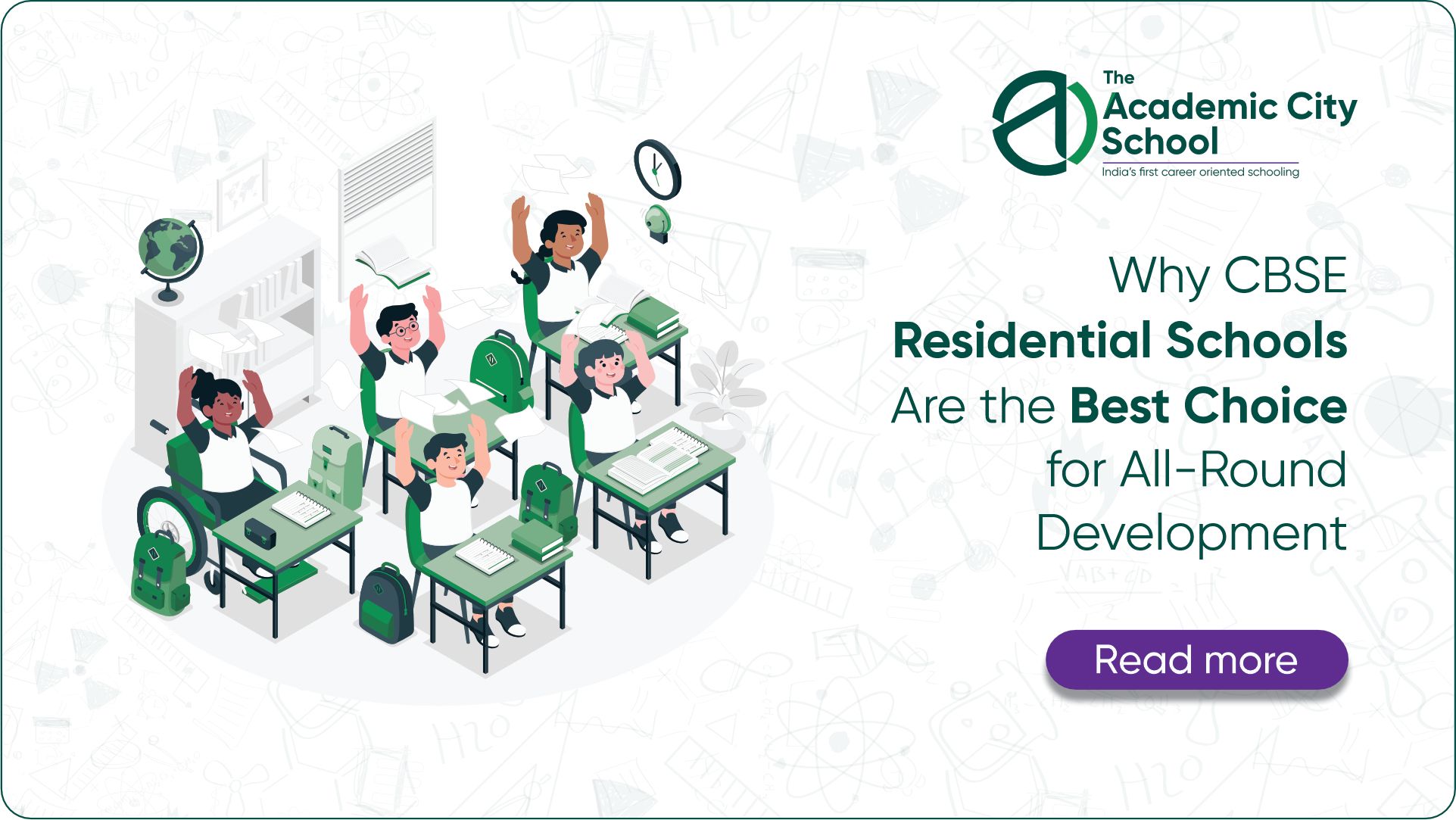
Unlocking Academic Excellence and Life Skills Through CBSE Boarding Education
I. Introduction: Schooling That Shapes Life
What if schooling could nurture intellect and character—all at once?
That’s the promise of CBSE residential schools in India. Parents today seek a learning journey that builds independence and emotional maturity. Boarding schools under the CBSE umbrella are increasingly becoming the answer, blending academic rigor with personal growth.
At The Academic City School, this vision is a daily practice.
II. The CBSE Advantage in Residential Life
1. A Foundation of Academic Strength
The CBSE curriculum is designed to create consistency and recognition across the country. In a residential setup, its structure becomes even more powerful. Students follow supervised study hours, guided by teachers who track their progress closely.
2. Learning Through Understanding
Unlike rote-driven systems, CBSE emphasizes application and analysis. With labs and project-based assignments, children discover how to think critically, a skill essential in today’s world.
III. Growth Beyond the Classroom
1. Building Life Skills
From time management to independent living, boarding life ensures children learn resilience and responsibility. From the start to the end of the day they need to plan and organize their day. This helps them build skills they’ll use far beyond school.
2. Emotional Strength and Social Intelligence
Living with peers nurtures collaboration and the ability to compromise without complaining. Counselors and mentors within CBSE residential schools in India provide the safety net children need to handle challenges confidently.
3. Creativity and Expression
Sports, debates, arts, and community service are never afterthoughts—they are integral. Many CBSE boarding schools in Madhya Pradesh and Bangalore have dedicated programs to help students discover passions early.
IV. What Makes Boarding Different
The residential setting adds an entirely new dimension. Students are immersed in structured routines and a supportive environment. Minimal distractions allow sharper focus, while diverse peers teach children to value cultures beyond their own. This nurtures acceptance and openness.
V. Future-Readiness Through CBSE Boarding
1. Preparing for College and Careers
With CBSE’s solid foundation, students are well-placed for national exams and international universities alike. Career guidance is woven into school life, with mentorship beginning early.
2. Leadership and Global Competencies
Model UN, entrepreneurship modules, and debate clubs give students the chance to lead and problem-solve.
According to an NCERT framework, such activities “foster a growth mindset and prepare learners for real-world complexities.”
VI. Choosing the Right CBSE Residential School
Parents should look at:
- Curriculum quality & faculty support
- Pastoral care and emotional well-being
- Infrastructure — labs, libraries, and co-curriculars
- Balance between academics and life skills
Whether in CBSE boarding schools in Madhya Pradesh or CBSE residential schools in Bangalore, the right environment transforms education into an experience.
VII. The Academic City School: CBSE Excellence in Action
At The Academic City School, every student benefits from:
- CBSE academic rigor with Individual Progression Plans (IPPs)
- A blend of life-readiness programs and global exposure
- A strong pastoral system that ensures care and confidence
Here, children prepare for life.
VIII. Conclusion: Education That Lasts a Lifetime
CBSE residential schools are ecosystems where children grow into capable, confident individuals. At The Academic City School, this focus on holistic growth makes us one of the most trusted CBSE residential schools in India.
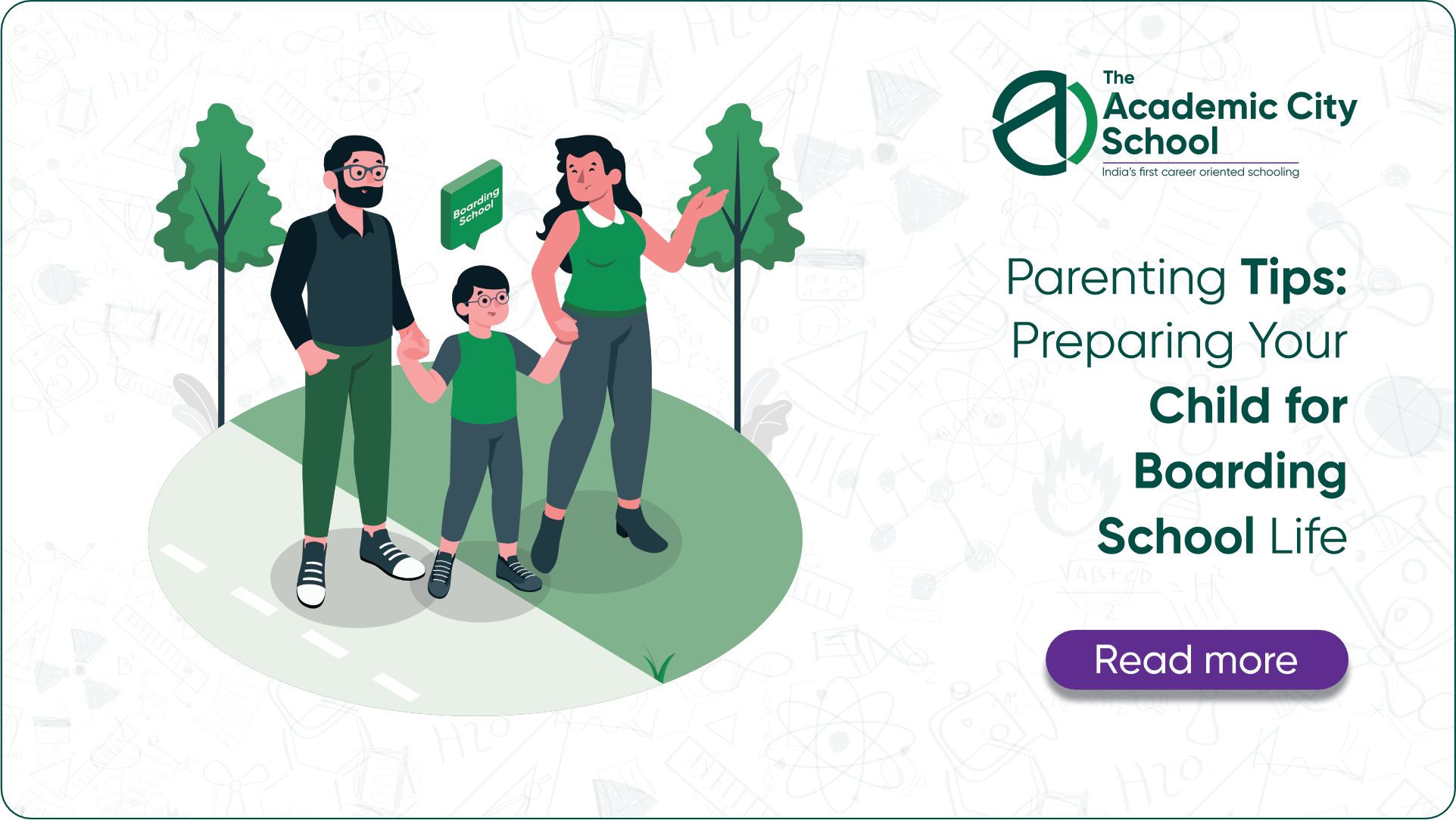
A Gentle Guide for Parents — How to Help Children Transition with Confidence.
I. Introduction: A New Chapter in Parenting
Every parent dreams of giving wings to their child. But how do you prepare them to fly on their own?
Choosing a boarding school is about preparing a child for life. With more families exploring boarding schools in India, parents often wonder how to make the transition smooth.
At The Academic City School, we believe that while schools nurture independence, parents lay the emotional foundation that makes every transition easier.
II. Why Boarding Life Can Be a Gift
A. Independence with Structure
Boarding schools cultivate daily habits that build accountability and responsibility. This foundation helps children grow into individuals who can manage life’s challenges with steadiness.
B. Future-Ready Edge
Many future-ready boarding schools in India focus on global exposure along with academics. This prepares children to thrive in university settings and future workplaces.
III. Emotional Preparation: How Parents Can Help
A. Conversations That Count
Speak openly about what boarding life is like. Talk about new routines, friendships, and environments—and the excitement of opportunities. Share stories of growth instead of fear.
“Children adjust best when they know what to expect and when they feel involved in the decision.” — Dr. Shefali Tsabary, Clinical Psychologist
B. Small Practice, Big Impact
Short sleepovers with relatives or holiday camps give children confidence to manage without parents for brief periods. Managing things independently eases the adjustment.
IV. Practical Steps Before the Move
- Teach basic life skills: laundry, folding clothes, washing plates, organizing, and polite communication.
- Build simple evening study routines that mimic prep hours in school.
- Provide small emotional anchors: a favorite book, family photos, or handwritten notes.
V. Partnering With the School
Adjustment works best when parents and schools collaborate. Attending orientations and engaging with teachers helps children feel supported and understood.
VI. Thinking Long Term
Many boarding schools begin higher-education planning early with counseling and workshops that expose students to diverse career paths. Parents can support by encouraging open conversations about passions and interests—not just grades.
VII. The Academic City School: A Second Home
At The Academic City School, every child is prepared to grow with courage and care.
- CBSE excellence blended with global programs
- Structured routines without rigidity
- Career and higher-education guidance from middle school
- A warm, inclusive community where independence blossoms
VIII. Letting Them Grow, Not Go!
Preparing your child for boarding life is about stepping beside them differently. Parents provide courage; schools provide wings.
“The greatest gifts we can give our children are the roots of responsibility and the wings of independence.” — Hodding Carter, Journalist
At The Academic City School, we help parents and children walk this journey together—making independence a source of pride!
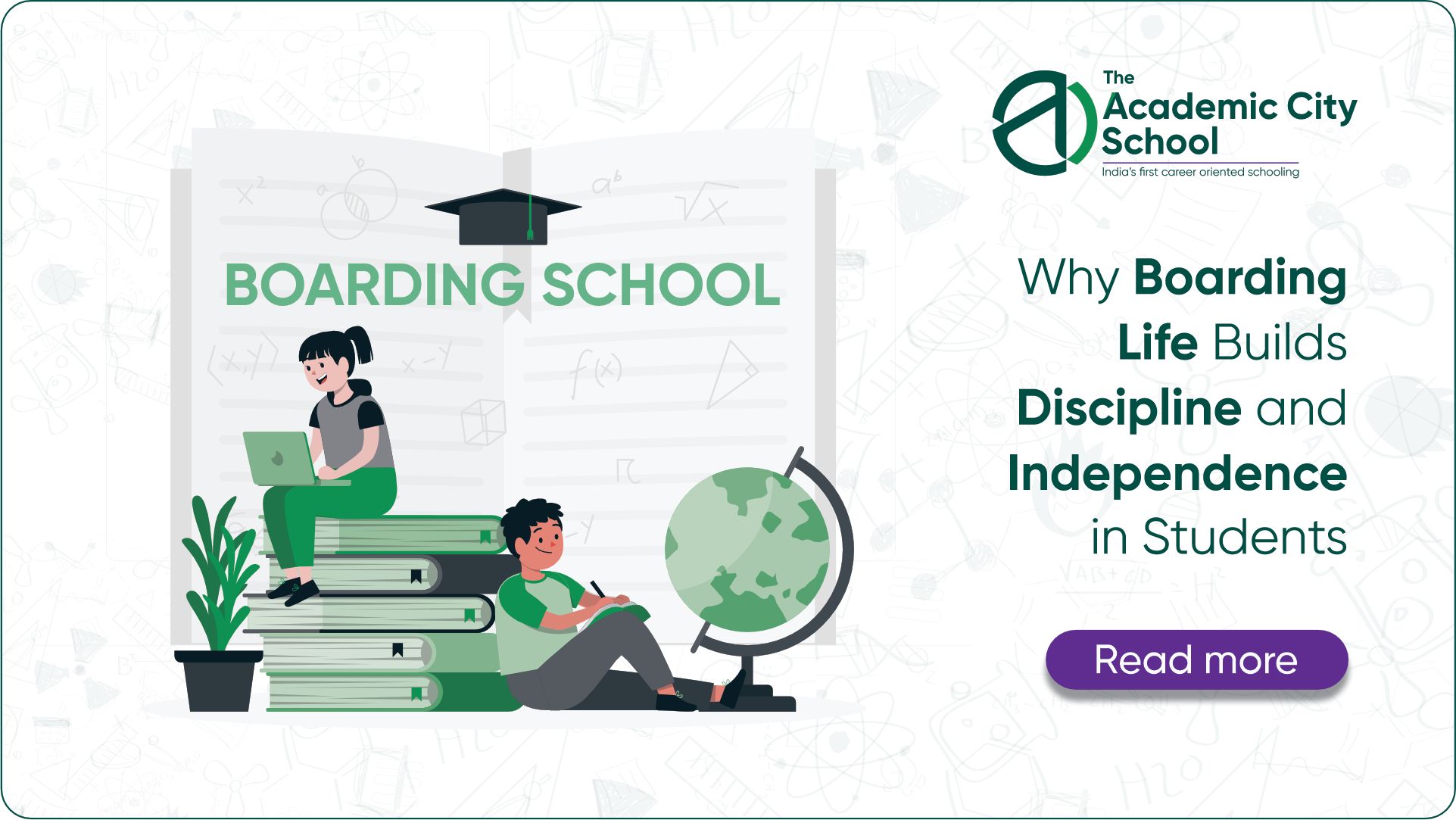
A Transformational Journey from Dependence to Discipline—How Boarding Schools Shape Tomorrow’s Leaders
I. Growing Strong Through Experience
“Every parent dreams of a child who can think clearly and act responsibly.” Today, more families are looking at boarding schools in India for boys and girls as a way to nurture independence. Boarding life shapes character. At The Academic City School, discipline and independence are a part of everyday life.
II. Lessons That Shape Character
A. Structure That Teaches Responsibility
Daily schedules such as assemblies, classes, study hours, and sports help students stay consistent. Over time, punctuality and accountability become habits.
B. Practical Independence Beyond Home
At home, chores are often shared or avoided. At hostel schools for boys and girls in India, students manage personal routines themselves. This self-reliance prepares them for adulthood.
C. Learning With and From Peers
Living together builds mutual support. Seniors mentor juniors and teach by example, creating a healthy cycle of accountability and independence.
III. Building Emotional Strength
A. Coping Without Parents
“Children grow in confidence when they face challenges and realise they can solve problems themselves.” — Dr. V.S. Ravindran, child psychologist
Time away from family teaches resilience through real-world problem solving in a safe, supervised environment.
B. Confidence in Daily Choices
From managing study schedules to using free time wisely, students develop decision-making skills. Each choice builds confidence and accountability.
IV. Discipline That Strengthens Learning
Academic consistency grows when study hours are structured. Teachers provide extended mentorship that balances academics with life skills and character development.
V. Boarding: Why It Counts
Boarding schools in India focus on holistic development. Shared community life nurtures responsibility, teamwork, and empathy.
VI. Long-Term Benefits of Discipline and Independence
- Adaptability in college and professional life
- Confidence in global environments
- Stronger leadership and resilience
Quick Insight: A 2022 survey in Educational Leadership Review found that boarding graduates show double the adaptability in early careers compared to day scholars.
VII. The Academic City School Approach
Parents choose The Academic City (TAC) because:
- Discipline is encouraged without rigidity
- Life skills programs boost independence
- Faculty ensure students feel supported while growing stronger
VIII. Closing Reflection: A Lifelong Gift
Boarding life is more than distance from parents—it is closeness to personal growth. The goal is not separation; it is preparation. Children leave The Academic City ready to thrive.
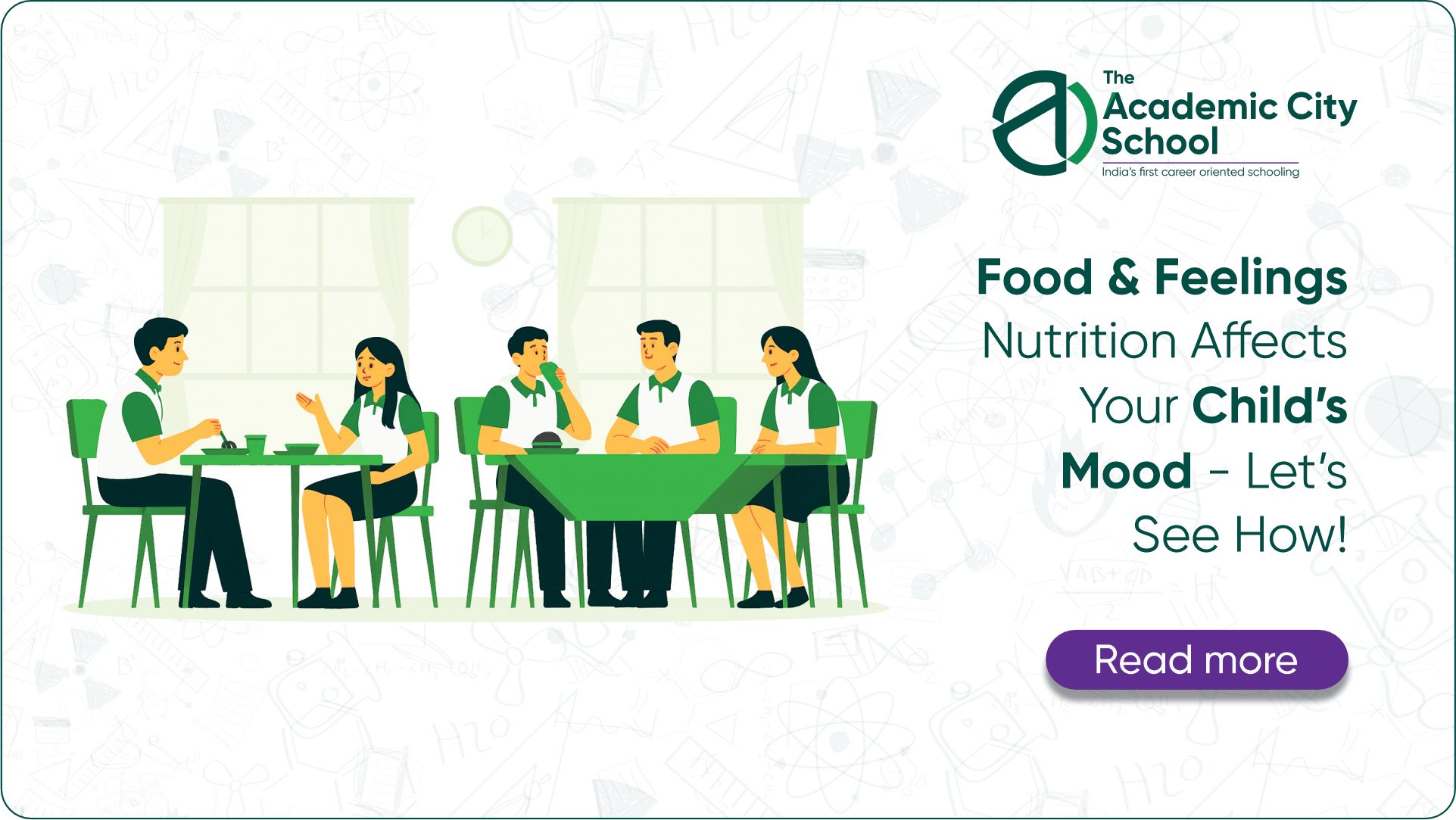
The Science Behind Mood and Nutrition
- Blood Sugar & Stability: Sudden spikes and crashes from sugary foods lead to irritability and poor focus.
- Gut–Brain Connection: A healthy gut with probiotics (like curd, fermented foods) supports better mental health.
- Key Nutrients:
- Omega-3 fatty acids → support calmness and reduce anxiety.
- Iron & Vitamin B12 → reduce fatigue and improve attention.
- Complex carbs (whole grains, millets) → sustain energy for longer hours.
Expert insight: According to the American Psychological Association, balanced diets with adequate micronutrients can significantly reduce the risk of anxiety and mood swings in children.
How Boarding Schools Approach Nutrition
At boarding schools in Karnataka, meals are carefully planned to align with holistic child development. International residential schools in Bangalore often:
- Offer nutritionally balanced menus planned by dieticians.
- Integrate local flavors with global cuisines for variety and nutrition.
- Educate students about healthy food choices through workshops and interactive dining experiences.
Emotional Benefits of Nutritious Eating
- Improved Concentration — Healthy breakfasts enhance classroom focus.
- Better Sleep — Magnesium-rich foods (like leafy greens, seeds) help regulate sleep cycles.
- Resilience to Stress — Antioxidant-rich fruits and vegetables can lower cortisol (the stress hormone).
- Positive Peer Interactions — Stable moods foster stronger friendships and cooperation.
A UNICEF report highlights that children who consume a balanced diet demonstrate better learning outcomes and improved social behavior.
Tips for Parents: Supporting Nutrition at Home
- Keep junk minimal: Weekend treats are fine; balance them with fresh, home-cooked meals.
- Hydration matters: Encourage water over aerated drinks.
- Involve kids: Let them plan or cook simple meals to build ownership.
- Consistency: Routine meal timings mirror boarding-school structure and create stability.
The Academic City School Perspective
At The Academic City School, food is considered part of the curriculum of care. Students experience:
- Seasonal, farm-fresh ingredients sourced locally.
- Menus created with both nutrition and taste in mind.
- Workshops linking food, feelings, and focus, helping children become aware of their own well-being.
Here, nutrition becomes education, shaping not just healthier bodies but also happier minds.
Final Word
Nutrition is the foundation for emotional and physical health. As future-ready boarding schools in India understand, shaping a child’s future starts with what’s on their plate.

Why Study Habits Matter More Than Study Hours
Research consistently shows that effective habits outweigh sheer study time. Students with consistent routines tend to retain knowledge longer and perform more confidently in assessments. The American Psychological Association highlights that creating small, repeatable study practices builds self-regulation skills, which predict long-term academic and career success.
The Science of Habit Formation
According to Dr. Wendy Wood (Professor of Psychology and Business, USC), habits form through repetition in stable contexts. For children, this means:
- Studying in the same place daily.
- Linking study time with consistent cues (for example: after a snack, sit down to study).
- Keeping distractions minimal so focus becomes automatic.
Neuroscience studies suggest that once a behavior becomes habitual, it requires less willpower—freeing mental energy for deeper learning.
Common Challenges Parents Face
- Over-scheduling: Between tuitions, activities, and screen time, children rarely find quiet, consistent time.
- Stress cycles: Pressure to perform can create avoidance behaviors instead of motivation.
- Parental conflict: Parents push for longer hours and children resist, leading to stress on both sides.
How Boarding Schools Create an Environment for Habits
- Structured timetables
Good boarding schools in India build consistency through daily schedules that balance academics, co-curriculars, and rest. This structured rhythm makes studying less about willpower and more about natural flow. - Peer influence
In residential schools, children see peers studying at fixed hours, which normalises the behaviour. Peer modelling reduces resistance and builds motivation. - Mentor support
Teachers in CBSE residential schools in India provide study-skills training—note-taking, memory strategies, and exam preparation. Unlike at home, help is available in real-time when confusion arises. - Balance of routine and freedom
Future-ready boarding schools in India combine discipline with flexibility. As students mature, they learn to manage their own schedules—a vital skill for university life.
Practical Tips Parents Can Try at Home
Even if your child isn’t in a hostel, you can adopt similar principles:
- Create a fixed daily study slot (same time and place).
- Encourage active study methods like mind maps, flashcards, or teaching a sibling.
- Use short study bursts (Pomodoro technique) with breaks to prevent fatigue.
- Celebrate consistency over grades—reward the habit, not just the result.
- Encourage reflection: ask “What did you understand today?” instead of “How many pages did you finish?”
Expert Insight
“Habits formed in childhood become the foundation of lifelong learning. Children who internalize the discipline of structured study early not only excel academically but also demonstrate resilience in professional and personal arenas.” — Dr. Wendy Wood, Professor of Psychology and Business, University of Southern California (Good Habits, Bad Habits, 2019)
The Long-Term Impact
- Students with strong study habits adapt better to higher-education challenges.
- They handle academic transitions (board exams, competitive exams, college life) with less stress.
- Schools that prioritise habit-building—not just marks—produce independent, confident learners.
Why The Academic City School Emphasises Habits Over Hustle
At The Academic City School, the focus goes beyond academics:
- Structured evening study hours guided by mentors.
- Workshops on time management and self-discipline.
- Access to counsellors who help students reflect on learning strategies.
- Peer study groups that make study habits social and enjoyable.
- Faculty emphasise balance in study, play, and reflection to prevent burnout.
This balance ensures students are not just exam-ready but future-ready.
Conclusion
Healthy study habits grow from consistency, supportive environments, and the right mindset. With parents and schools working together, these habits stay with children long after school—preparing them for life.
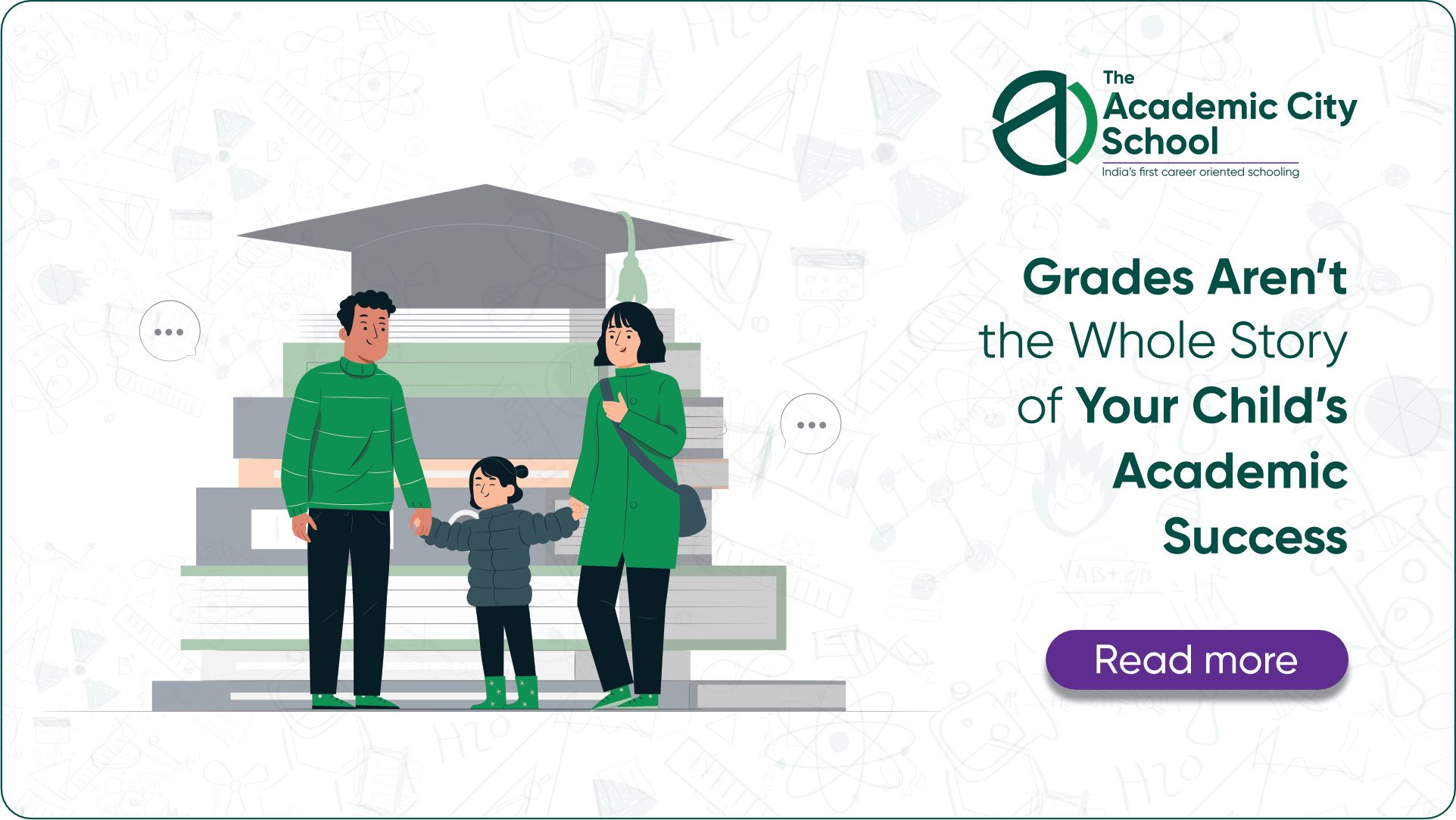
Success is one of the most debated words in education. For some, it’s measured in grades and ranks. For others, it’s about resilience, creativity and empathy. When it comes to children, parents often find themselves caught between these two definitions. The truth lies somewhere in the middle: success is not a one-size-fits-all journey, but a deeply personal path that every child walks differently.
Redefining Academic Success
“Students who are conscientious, open, and emotionally stable outperform their peers, sometimes by a full grade, even more so than high intelligence alone.” — Arthur Poropat, psychologist, summarising findings from Griffith University’s meta-analysis on academic success ~ Source Time
Beyond Marks: Building Skills for Life
At career focused hostel schools in Bangalore, students are guided to link classroom learning with real-world application. Success here means being able to debate thoughtfully or create confidently. Students are exposed to leadership roles, entrepreneurship projects and career counseling sessions which ensure that their achievements extend beyond report cards.
The Role of Environment in Defining Success
CBSE boarding schools in Madhya Pradesh and across India create structured yet flexible environments where students learn discipline while exploring personal interests. This balance ensures that children discover passions. Success is when a child learns to set their own expectations.
What Parents Can Do
- Encourage progress, not perfection.
- Celebrate effort as much as achievement.
- Partner with teachers and mentors to understand strengths and challenges.
- Allow children to fail and recover, because resilience is a bigger marker of success than any grade.
Where Vision Meets Reality
At The Academic City School, we believe every child defines success differently. That’s why our approach blends rigorous academics with career counseling, leadership training and exposure to global perspectives. With mentors who give structured guidance and a nurturing environment, we ensure students graduate with meaning.
A Better Question for Parents
Instead of asking, “Did my child come first?” ask, “Did my child learn, grow and stay curious today?” Because real success is not about being ahead of others, it’s about being ready for the future.
Curious about how we define success at The Academic City School? Visit our website
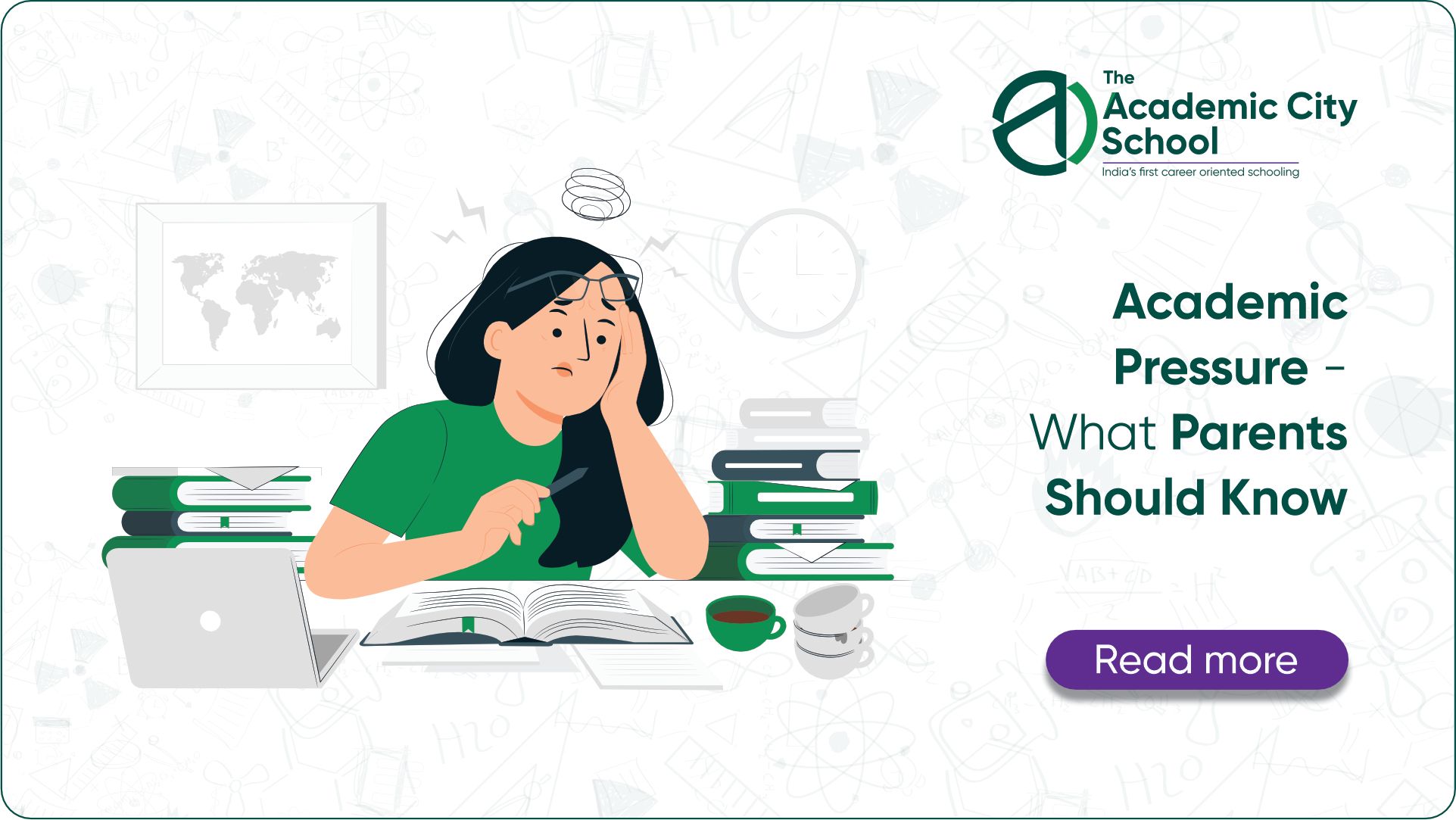
The Hidden Toll of Academic Ambition
Students face immense academic pressure. While ambition drives excellence, it can quietly lead to stress, with serious consequences for well-being and performance.
Clues That Stress Is Building
- The Physical Warning Signs: Frequent headaches, sleep troubles, sudden tiredness or complaints about tummy aches, without a clear medical cause, often signal academic overload.
- Behavioral Shifts: A once-enthusiastic child may withdraw from friends, show irritability or lose interest in activities they once loved.
- Academic Indicators: Watch for procrastination, perfectionism or sudden drops in grades, not always due to ability, but often a shield against overwhelm.
Real-World Insight from UNESCO
A recent UNESCO Global Education Monitoring Report notes that globally, increasing learning pressures are contributing to a rise in educational disengagement and emotional strain among young learners. Even well-designed academic systems like those in CBSE boarding schools in India must proactively guard against this silent stress.
Why Boarding Schools Matter in Prevention
In good boarding schools in India, the community structure helps:
- Teachers and counselors can notice shifts in routine, mood or social interaction quickly.
- Peer bonding and structured downtime offer natural buffers against isolation or anxiety.
- Mental health support is embedded into routines.
How Career Counseling Makes a Difference
Boarding schools for career counseling in India reduce stress by adding clarity and direction:
- Personalised guidance: Helps students align goals with strengths.
- Counseling sessions: Reframe pressure as progress rather than perfection.
- Shift of focus: From grades to growth, reducing anxiety and enhancing confidence.
Practical Tips for Parents
- Use open-ended questions: Ask “What made today tough?” rather than “How did you do?”
- Model calm: Share how you manage pressure, whether it’s through deep breaths, reflection or small rituals.
- Keep in touch: Observe changes in sleep, mood or appetite as early signals.
- Reach out: A brief check-in with a school counselor can make a big difference.
Why This Matters at The Academic City School
We believe emotional strength is as foundational as academic skills. That’s why our curriculum blends structured learning with well-being:
- Regular mentoring conversations
- Quiet zones for reflection
- Ongoing counseling built into the learning journey
Because true readiness is about building resilience!
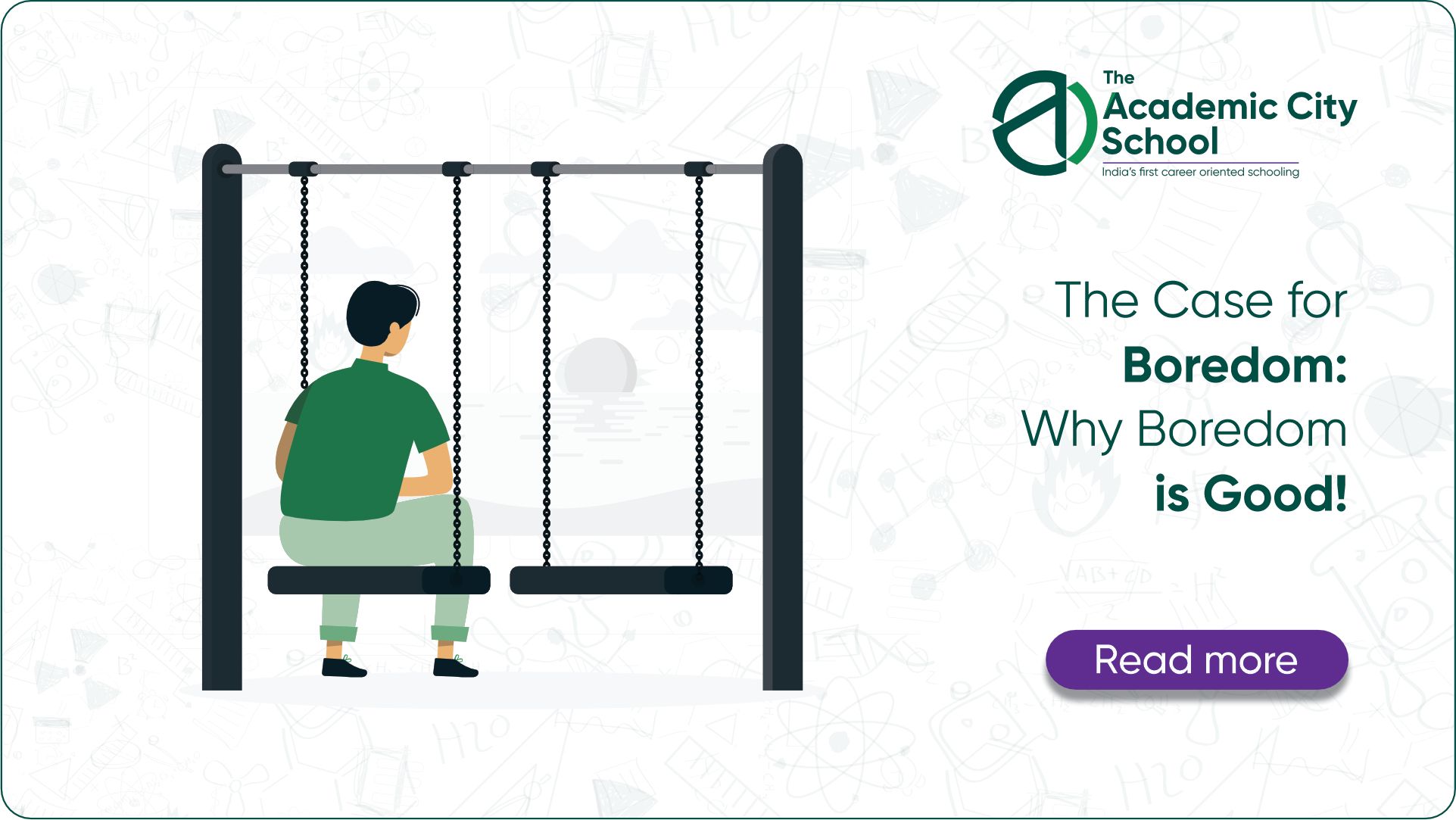
Introduction
In today’s hyper-scheduled world, silence feels strange and idleness almost unacceptable. Parents rush to fill every gap with classes, screens and activities. Yet research tells us that boredom is not a problem. It in fact is a gift. Good boarding schools in India are beginning to embrace boredom as a vital tool in preparing children for life.
Why Boredom Matters
When children feel bored, their minds wander. This wandering is what sparks imagination, problem-solving and resilience. Neuroscientists have found that “default mode” brain activity, the kind that happens when we daydream, encourages creative thinking. Without boredom, children risk becoming excellent at consuming information but poor at generating ideas.
Creating Space for Stillness
Future ready boarding schools in India understand that downtime is as important as classroom time. Structured routines create balance between activity and quiet. Students may spend an evening without screens, simply reading, reflecting or enjoying unstructured play. In these moments, they learn to manage restlessness and discover inner resources.
Emotional Strength Through Boredom
CBSE residential schools in India have also noticed how boredom builds emotional depth. Children who are given time to “just be” are better at self-regulation. They develop stronger emotional resilience because they are not constantly distracted from discomfort. As one education psychologist, Dr. Sandi Mann, author of The Upside of Downtime, notes:
“Boredom is a search for neural stimulation. If we can’t find it, our mind will create it.”
This insight explains why students in boarding schools often come up with innovative ideas during unscheduled hours.
Practical Tips for Parents: Help Your Child Embrace Boredom at Home
While boarding schools provide structured downtime, parents can also create healthy space for boredom at home. A few simple ways include:
- Limit Screen Time: Avoid filling every free moment with digital devices. Idle minutes are valuable.
- Encourage Independent Play: Allow children to create their own games or stories rather than stepping in immediately with activities.
- Model Stillness: Let children see you read, reflect or simply sit quietly. This normalises pauses.
- Avoid Overscheduling: Too many classes and commitments can prevent children from discovering themselves.
- Provide Tools, Not Answers: Offer books, art supplies or a journal instead of ready-made entertainment.
Conclusion: Turning Restlessness Into Readiness
Boredom teaches children to pause and think which in turn helps them grow. By embracing boredom, boarding schools and parents together prepare children to thrive in life.
At The Academic City School, students experience this balance, where structured learning meets the freedom of stillness and where every idle moment can spark imagination.
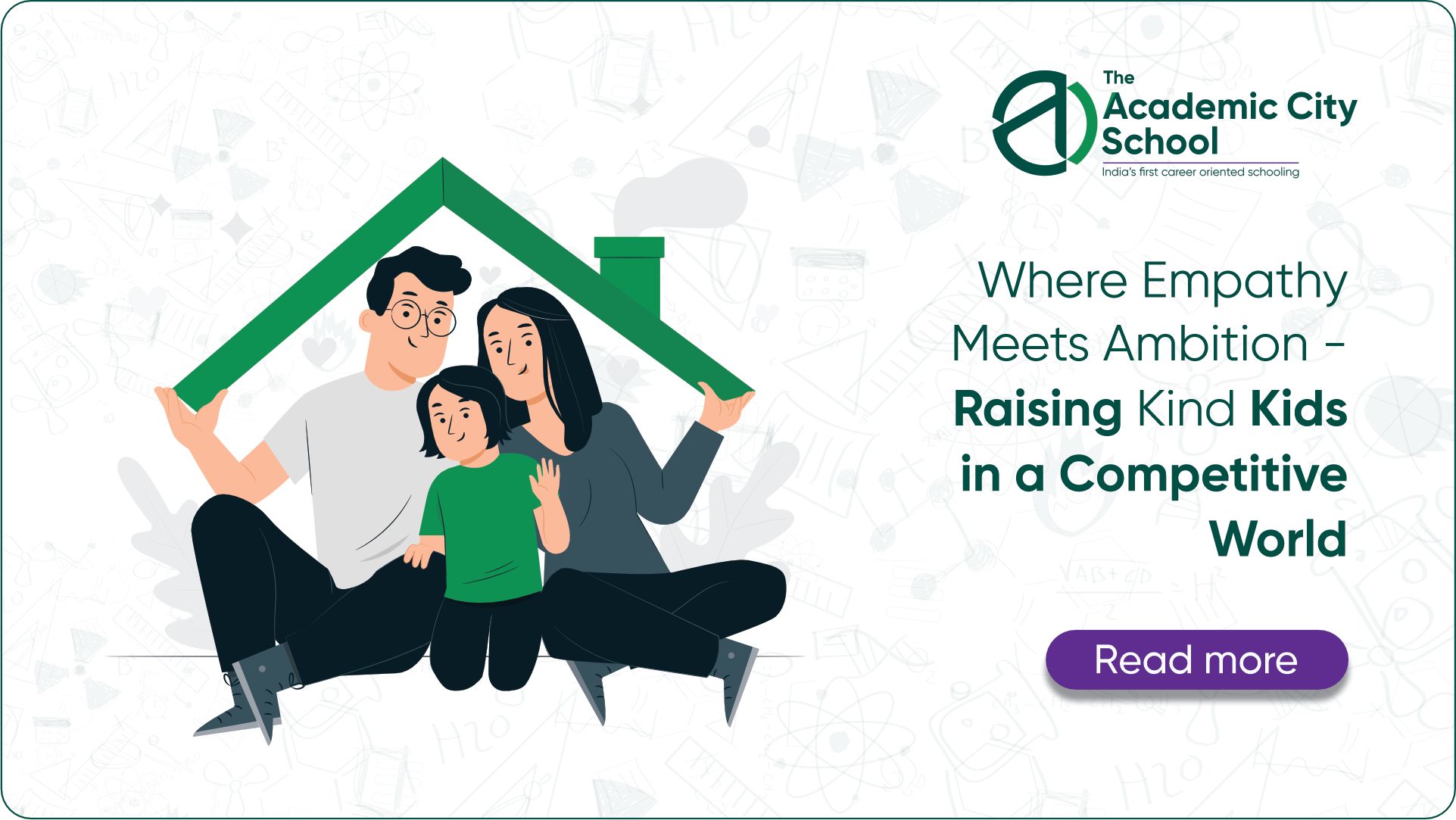
In today’s high-pressure environment, parents and schools often focus heavily on academic performance, career readiness and extracurricular excellence. But there’s one quality that quietly shapes a child’s success and happiness for life - kindness.
Kindness is not the opposite of ambition. In fact, in future ready boarding schools in India, kindness is seen as a strength that builds trust and makes the child emotionally intelligent - all critical for thriving in both personal and professional life.
1. Why Kindness Matters More Than Ever
In a competitive world, a child who can balance achievement with empathy is better equipped to lead and inspire.
In the workplace, leaders who are empathetic and collaborative build stronger teams. In personal life, kindness strengthens relationships and builds resilience.
2. Lessons Begin at Home and Continue at School
Parents set the foundation for empathy through everyday actions like sharing, listening and encouraging respect for all.
Boarding schools in India build on this foundation through community living, where students learn to cooperate & resolve conflicts and support peers across diverse backgrounds.
3. Turning Competition Into Collaboration
Healthy competition motivates. But when children see peers as partners, not just rivals, they develop collaborative spirit.
In career focused hostel schools in Bangalore, project-based learning often involves mixed-age teams, where senior students mentor juniors, reinforcing leadership and kindness in one go.
4. Building Emotional Intelligence
Kindness is rooted in understanding others’ feelings. Schools can integrate activities like role-play, community service, reflective journaling and sharing of experiences to build emotional intelligence.
Future ready boarding schools in India also bring in experts for workshops on empathy and cultural sensitivity, which in turn helps with inclusion.
5. A Culture That Rewards Character
When schools recognise acts of kindness alongside academic achievements, they send a clear message - character matters.
At The Academic City School, acts of support, peer mentoring, contributions to community life and kindness are acknowledged in assemblies and newsletters making kindness part of the reward system.
The Takeaway
In a world that constantly measures scores and ranks, kindness is the quiet strength that shapes leaders of tomorrow.
Raising kind kids is not about shielding them from competition. It’s about preparing them to compete with integrity and succeed with humanity.
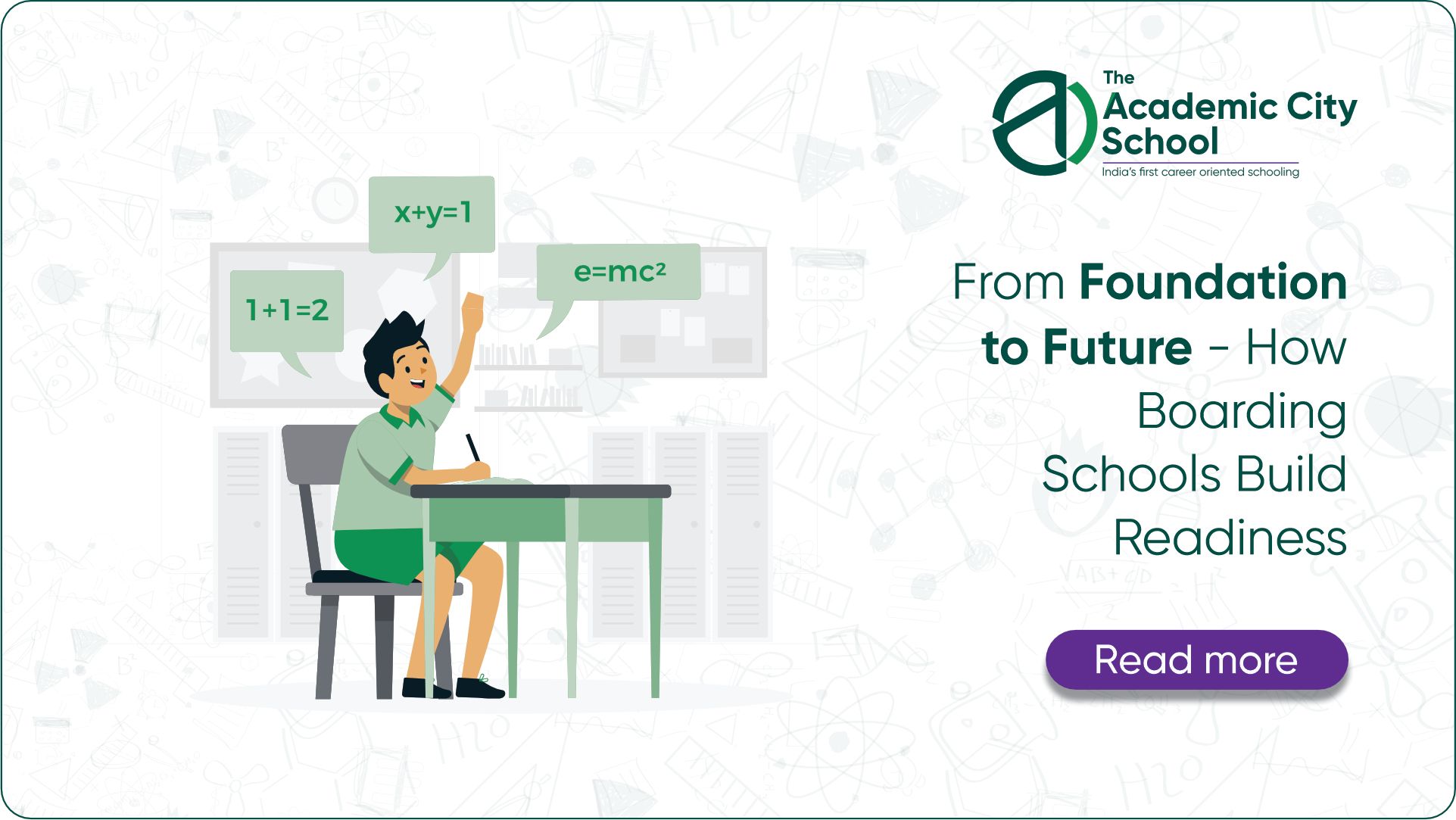
“The world is changing. Shouldn’t our children’s education evolve too?”
Today’s most impactful education goes beyond textbooks. It prepares children for a world we can’t fully predict. It nurtures them not just to score well but to think clearly, act responsibly and dream fearlessly. In this context, boarding schools in India for are no longer traditional institutions, they are becoming ecosystems for future readiness.
At The Academic City School, this transformation is already underway.
What It Really Means to Be Future-Ready
Being future-ready is not just about grades. It’s about developing skills that help children thrive in careers and relationships. That includes adaptability and emotional intelligence along with the ability to learn continuously.
A student who is ready for the future knows how to manage time, make mindful choices and work focussed towards goals.
How Boarding Schools Shape Future-Ready Students
Structured Environment, Sharper Thinking
Routines teach discipline. Fewer distractions mean better focus. And access to mentors outside of classroom hours means that learning doesn’t stop when the bell rings. CBSE residential schools in India offer an immersive space where children develop thinking habits that last a lifetime.
Exposure to Careers – Early and Often
At international boarding schools for career guidance, students attend guest lectures, interactive sessions and participate in hands-on workshops with professionals. This early exposure widens their horizons and helps them link passions to possibilities. Personality and aptitude assessments guide students toward suitable paths.
Personalised Career Support
From Grade 8 onwards, many boarding schools for career counseling in India offer dedicated teams to help students track their goals. One-on-one sessions with counselors and collaborative sessions with parents help build a strong sense of direction early in life.
Planning Ahead for College and Life
Structured Support for Higher Education
Boarding schools for higher education planning focus on preparing students for entrance exams, interviews and university life. Guidance counselors support students through the application process and help them to build portfolios, write essays and prepare for competitive exams.
Academic Performance Meets Emotional Strength
A good school ensures that performance is matched with well-being. Students are encouraged to reflect so that they are better prepared to handle pressure constructively. This balance makes them not just college-ready but life-ready.
Skills That Set Students Apart
Students in career focused hostel schools in Bangalore learn leadership, financial literacy, communication and problem-solving, skills that are essential for both work and life. The environment itself is conducive for creativity and initiative.
“Students from residential schools are 40% more likely to take initiative in group tasks.” (Source: Educational Leadership Review, 2024)
The Power of Place: Why Bangalore Matters
Bangalore, with its tech industry, innovation hubs and academic institutions, offers unique exposure to career trends. International residential schools in Bangalore connect students to this ecosystem. Students benefit from the exposure that guest lectures, project-based learning and a cultural environment that fosters curiosity, gives.
Where Vision Meets Action: The Academic City School
The Academic City School is not just a CBSE boarding school. It is a platform where students discover who they are and what they can become.
- Every student has an Individual Learning Plan
- Career Guidance is embedded in academics
- Leadership and entrepreneurship modules begin early
- Faculty include global mentors and industry experts
- Exposure to both Indian and international universities
Here, future readiness is a process, practiced daily.
A Better Tomorrow Begins Today
When you choose a boarding school, you choose more than academics. You choose values, life skills and a community that shapes your child’s future.
At The Academic City School, students don’t just graduate with courage, clarity and capability!
Curious about how it works in real life? Visit our website
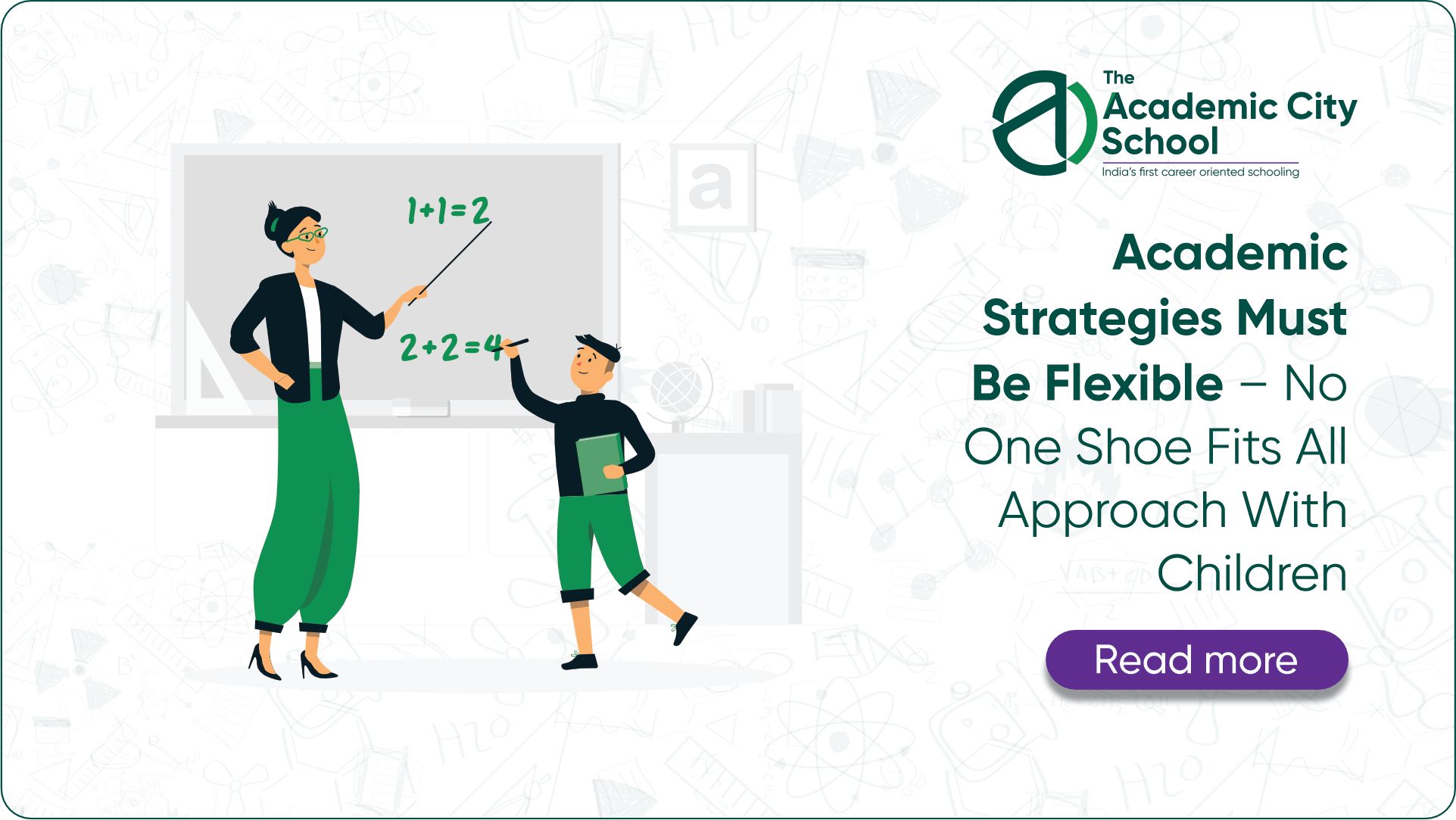
Why Flexibility Matters in Education
Every child learns differently. Some grasp concepts in minutes, others need more time to explore and understand. Yet, too often, academic systems treat them the same way. Dr. V.S. Ravindran, one of India’s leading child psychologists, points out that learning thrives when it respects the learner’s pace. For parents, this means seeking environments where teaching adapts to the child, not the other way around.
Recognising Different Learning Styles
Some children are visual learners, others are auditory or kinesthetic. Flexible academic strategies acknowledge these differences and offer varied ways to absorb and apply knowledge. International boarding schools in India often use blended learning methods, combining classroom discussion, digital tools and hands-on projects, so that every child finds their best fit.
Parent takeaway: Observe how your child learns best. Share this with teachers so strategies can align at home and school.
Pacing Learning to Match Readiness
A rigid, “everyone moves at the same speed” model can hold back fast learners and overwhelm others. Good boarding schools in India assess a student’s readiness before pushing new content, ensuring that foundations are strong before moving forward.
Parent takeaway: At home, avoid comparing your child’s speed with others. Instead, measure progress against their own past performance. A child should ONLY be compared to themselves and their past performance.
Integrating Career Awareness Early
Flexibility isn’t only about academic pace, it’s also about aligning learning with future goals. Career focused hostel schools in Bangalore weave in career exposure as early as middle school, letting students explore interests before making critical subject choices.
Parent takeaway: Discuss your child’s interests regularly, even if they change. Early career conversations reduce confusion later.
Adapting Assessment Methods
Not every child performs best in written exams. Progressive schools use a mix of assessments such as projects, presentations or peer reviews, to gauge learning. This flexibility reduces stress and gives a fuller picture of a child’s abilities.
Parent takeaway: When reviewing your child’s performance, consider skills outside test scores like creativity, teamwork, problem-solving, focus etc.
Creating an Environment for Self-Directed Learning
The most future-ready students are those who learn how to learn. International boarding schools in India encourage self-study blocks, research projects and student-led initiatives that help develop independence and responsibility.
Parent takeaway: Give your child time at home to pursue self-chosen projects, even if they seem unrelated to academics.
The Academic City School Approach
At The Academic City School, flexibility is part of our academic DNA. From differentiated instruction and adaptive pacing to career exploration and varied assessments, we ensure that no child is boxed into a one-size-fits-all model. Every student’s journey is planned with their strengths, pace and future in mind.
Closing Thought
When you choose flexibility over uniformity, you give children the freedom to grow at their own best pace. The goal is not to fit them into a mold, but to shape an education around who they are and who they can become!
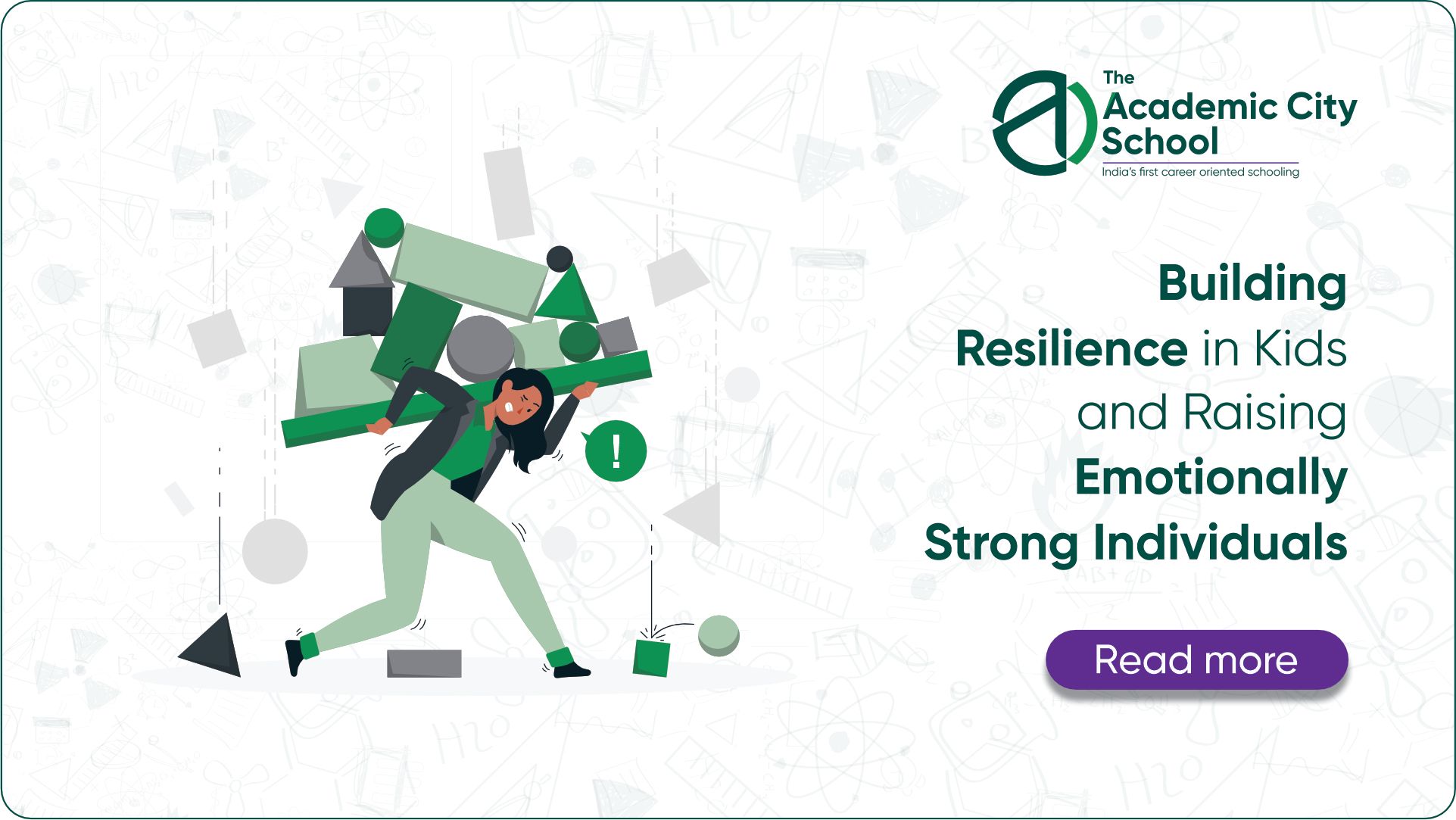
In a world where children face academic demands, social complexities and an unpredictable future, resilience has become the single most important life skill they can develop.
Dr. V S Ravindran, one of India’s most respected child psychologists, defines resilience as the ability to adapt well in the face of adversity, to recover quickly from setbacks and to keep moving forward with confidence. His research shows that resilience is not an inborn trait but a learned ability – something that parents, teachers and schools can actively nurture.
Emotional Safety: The First Layer of Strength
Resilience begins with trust. A child who feels emotionally safe is far more willing to take risks, make mistakes and try again. This safety net is built through consistent support from parents and educators.
Dr Ravindran emphasises that when adults listen without judgment and acknowledge children’s feelings, it strengthens their self-worth which is the cornerstone of resilience.
Practical Tip for Parents:
Ask reflective, open-ended questions like, “What part of today made you feel proud or happy or sad and why?” instead of only focusing on performance metrics.
Encouraging Healthy Struggle
Shielding children from all difficulties robs them of the chance to develop problem-solving skills. Resilient children are those who have experienced small failures, learned to cope and emerged stronger.
As Dr Ravindran notes, A supportive adult should guide, not rescue. Overprotection signals to the child that they cannot handle challenges.
In Practice:
Let your child handle age-appropriate tasks independently like managing their homework deadlines, organising their sports kit or resolving minor peer conflicts.
Building the Connection Between Effort and Growth
Children need to see that persistence and not perfection drives progress. Recognising effort over outcome helps them focus on the process of learning rather than fearing failure.
At Good Boarding Schools in India, this is often woven into daily life. Students live in environments where consistent effort in sports, academics or even creative pursuits is valued and celebrated by peers and mentors alike.
Creating Spaces for Expression
Resilient children know how to name and process their emotions. Whether it’s through art, sports, journaling or conversations, emotional expression prevents stress from becoming overwhelming.
Dr Ravindran’s workshops often highlight the role of schools in offering structured outlets such as debating clubs, theatre, sports teams, where students learn teamwork and emotional regulation.
The Role of Environment in Resilience
- While resilience starts at home, the school environment can strengthen it.
- CBSE Residential Schools in India offer structured daily routines that teach discipline and time management.
- Boarding Schools in India often integrate physical challenges like sports and adventure training, which build both physical and emotional grit.
- Strong pastoral care ensures that while students are encouraged to stretch their limits, they are never left without emotional support.
Modelling Resilience as Adults
Children absorb more from what they see than what they are told. When parents and teachers handle stress with composure, adapt to change and talk about solutions instead of dwelling on problems, children learn to do the same.
As Dr Ravindran says, Resilience is caught more than it is taught.
Choosing a School That Partners in Building Resilience
Resilience is not built in isolation – it’s a joint effort between home and school.
At The Academic City School, resilience is a deliberate part of our approach. Our residential setting offers a balance of structured routines and personal freedom, ensuring that students learn independence while always having mentors to guide them.
Here, challenges are viewed as learning opportunities and every child is supported to grow into a confident and emotionally strong individual.
The Takeaway
Resilience doesn’t mean a child will never face hardship. It means that when life gets tough, they have the inner strength, emotional balance and problem-solving skills to find their way forward.
As Dr Ravindran reminds us, A resilient child is not the one who never falls, but the one who always gets back up.
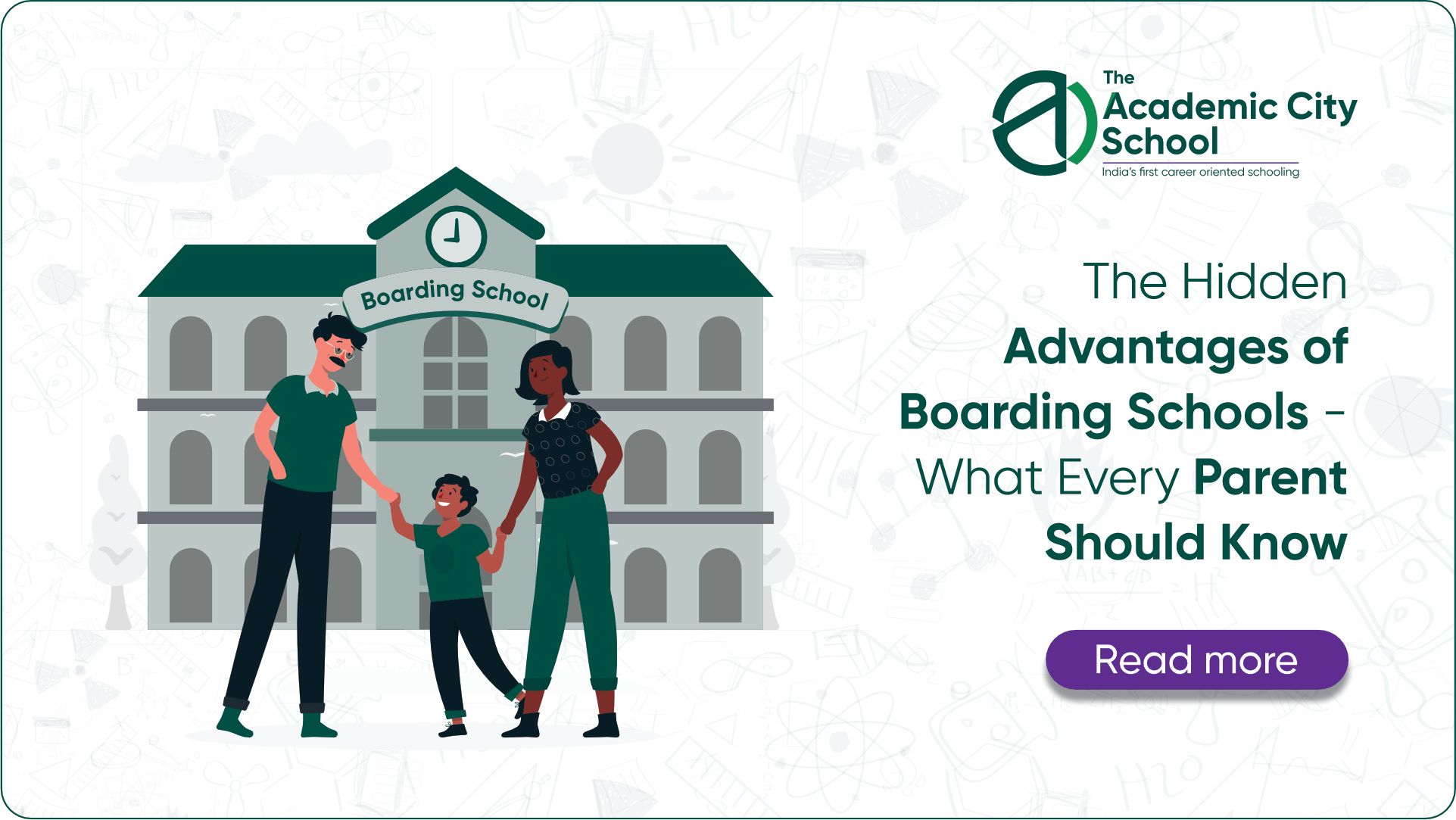
A. Introduction: Finding the Right School Where Your Child Thrives
Choosing a boarding school is one of the most important decisions a parent can make. It’s not just about academics—it’s about finding a place where your child feels seen, supported and inspired to grow.
In today’s world, parents are looking beyond textbooks. Some seek career-focused residential schools, others value holistic development and many explore CBSE boarding schools in Bangalore and beyond.
But what truly makes a boarding school the right one for your child? Let’s break it down.
B. Weighing the "Why": Is Boarding School the Right Choice for Your Child?
1. Core Benefits of Boarding School Education
- Builds independence and resilience in children.
- Fosters discipline through a structured daily routine.
- Offers a well-rounded curriculum promoting both academic and co-scholastic growth.
- Enhances life skills like leadership, critical thinking and communication.
- Encourages meaningful friendships, community bonding and social maturity.
- Exposes students to diverse cultures and global perspectives.
- Reduces distractions, enabling focused learning.
- Prepares students for life in college and beyond.
2. Assessing Your Child’s Readiness
- Signs your child is self-driven, curious and eager to explore.
- Willingness to adapt to a new environment without heavy emotional distress.
- Ability to take care of personal routines and hygiene with minimal supervision.
- Open to making new friends and exploring new activities.
- Enthusiastic about participating in a structured learning community.
C. The Smart Parent’s Checklist: Evaluating a Boarding School
1. Academic Programs & Curriculum
- Evaluate whether the school offers CBSE, Cambridge, IB or other options.
- Check for strong academic rigor, remedial support and enrichment programs.
- Look into faculty experience, teacher-student ratio and teaching methods.
- Does the school offer integrated coaching for JEE/NEET/SAT?
- Are tech-enabled classrooms or innovation labs part of learning?
2. Pastoral Care & Student Well-being
- Strong counselling programs for emotional and academic support.
- 24x7 wardens and trained staff ensuring safety in dormitories.
- Nutritious and hygienic meals with variety and personalisation.
- Anti-bullying policies and transparent grievance mechanisms.
- Regular parent-teacher connects and progress updates.
3. Extracurricular Activities & Holistic Development
- Range of clubs: robotics, drama, music, photography, debate, etc.
- Sports programs: swimming, basketball, athletics, tennis, etc.
- Platforms for leadership, collaboration and creativity.
- Festival celebrations and public speaking to build social confidence.
4. Facilities & Infrastructure
- Well-maintained hostels with essential amenities.
- Modern libraries, labs and AV classrooms.
- Indoor and outdoor sports facilities.
- 24x7 security and surveillance systems.
5. Location & Accessibility
- Proximity to cities and transport hubs.
- Peaceful and safe environment conducive to learning.
6. Cost, Fees & Financial Aid
- Transparent fee structure (tuition, boarding, activities, transport).
- Scholarships and need-based financial assistance.
- High ROI through academic and personality development.
7. Reputation, Accreditation & Alumni Network
- Recognised boards (CBSE, IB, Cambridge).
- Successful alumni in top universities and careers.
- Positive parent reviews and media recognition.
D. Your Roadmap to the Right Boarding School
- Initial Research & Shortlisting
Explore 20–30 schools online, check websites, virtual tours, social media and reviews. - Deep Dive & Narrowing Down
Shortlist 3–5 options, contact admissions, involve your child in the decision-making. - The Crucial Campus Visit
Visit campuses, observe facilities and classrooms, ask key questions and assess fit. - Application & Interview
Prepare application and your child for interviews; ensure all documents are ready.
E. The Academic City Could Be Your Ideal Choice and Here’s Why…
1. Our Unique Differentiators
- Career-Oriented Approach: Real-world skills introduced from Grade 8.
- Individual Progression Plans (IPPs): Personalized roadmaps for every child.
- Life Readiness Program: Focus on EQ, communication and decision-making.
- Award-Winning Excellence: Recognized for academic innovation and holistic development.
- Safe & Modern Infrastructure: A secure, green and tech-enabled campus.
- Dedicated Pastoral Care: Students are seen, heard and supported always.
2. Hear From Our Community
“Holistic development school! Really this is good school.” — Parent of a student
“I think as a parent I could not have managed shuttling between school, sports classes and guitar tuitions. I am happy that my child is getting all of it in one secure campus!” — Parent of a student
3. The Academic City Advantage
At The Academic City, we don’t just educate—we prepare. With global exposure, grounded values and structured personal development with a focus on career guidance, your child will be ready to thrive anywhere.
F. Making the Final Call: A Decision That Shapes Your Child’s Tomorrow!
- Choosing a boarding school is not just about academics—it’s about choosing a second home.
- Assess your child’s needs, research well and visit campuses.
- Look beyond rankings; focus on the culture, care and compatibility.
“If you're looking for a school where your child doesn't just study—but truly thrives—The Academic City could be that home away from home.”